Fit Mommy In Heels

How To Become A Yacht Stewardess: A Complete Guide
If you have ever wanted to trade in your 9-5 for a life of working on a luxury yacht, traveling the world, and meeting interesting people?
Well, then a career as a yacht stewardess might just be for you! Sounds like a dream, right? In this guide, we’ll dive deep into the world of yacht stewardess jobs and explore the ins and outs of the yachting industry.
From the daily duties and required training to interview tips and a step-by-step guide to becoming a successful yacht stewardess, I’ve got you covered.
Let’s get that dream job rolling!
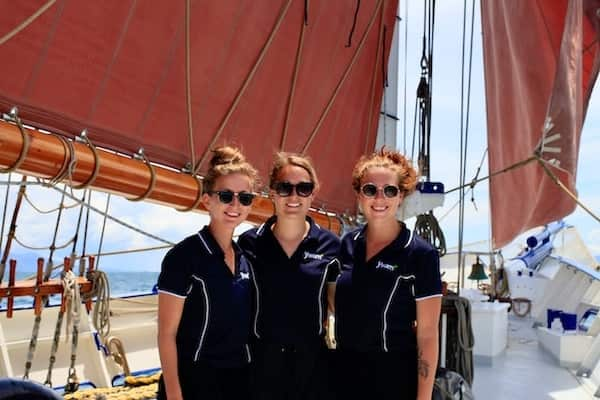
What is a yacht stewardess?
First off, you might be asking yourself “what is a yacht stewardess anyways?” Of course, this is important information to know if you’re looking at becoming one! The yacht stewardess is an integral part of the interior crew on private yachts and charter yachts.
They are responsible for providing top-notch customer service to yacht owners, their guests, and charter guests.
A stewardess is an entry-level position that often serves as a stepping stone to more senior roles, such as chief stewardess, in the yachting world.

How much do stewardesses make on a yacht?
The pay of a yacht stewardess can vary greatly based on a lot of things such as the size of the yacht, where it is located, and how many years of experience they have.
Generally, if you’re just starting out, you can expect to make around $2,500 to $4,000 per month.
More experienced stewardesses and chief stewardesses usually make more money.
Plus, yacht crew members often get tips from yacht owners and charter guests, which can really add to their income.
Here are some key factors that can affect how much a yacht stewardess makes:
- Position: Chief Stewardess, the person in charge of the inside of the yacht, usually makes more money than the other entry-level stewardesses.
- Experience: It probably goes without saying, but the more experience you have as a stewardess, the more money you’re likely to make since you’ll have better skills and know more about the job.
- Location: Pay can also vary depending on where the yacht is. For example, some areas (like the Mediterranean) might pay more because there’s more demand and/or fancier yachts.
- Charter Yachts vs. Private Yachts: Working on charter yachts can be a good way to earn tips from guests, which can really help increase your income. On private yachts, you might not get tips, but the pay could be more steady and reliable.

What does a Yacht Stewardess do every day?
The duties of a stewardess can vary, but they generally revolve around maintaining the interior of the yacht, tending to the needs of the yacht owners and guests, and ensuring a pleasant onboard experience.
Some of the responsibilities can include:
- Guest service and hospitality: Greeting guests, assisting with their luggage, and providing personalized services throughout their stay on the yacht.
- Housekeeping and maintenance: General housekeeping tasks such as cleaning guest cabins, bathrooms, and common areas, as well as laundry and ironing.
- Food and beverage: Serving meals and drinks, setting tables, and helping the chef with menu planning and food preparation.
- Event planning: Organizing and coordinating onboard (or off-board) events and parties for the yacht owners and their guests.
- Safety and emergency responsibilities: Participating in safety drills and being prepared to handle emergency situations, including fire fighting and personal survival techniques (which is part of the required education we’ll get to below).

Benefits of Being a Yacht Stewardess
Being a yacht stewardess has a lot of amazing benefits that make it a great and exciting career choice – especially while you’re younger.
One of the best parts is the chance to travel to beautiful places and experience different cultures while you work.
You’ll get to see stunning beaches, lively cities, and amazing coastlines all around the world. Plus, the pay is usually pretty good, especially on a charter yacht where you can receive tips from your guests.
Since your living costs like housing and food are covered when you’re on the yacht, you can save more of your earnings.
Another great thing about being a yacht stewardess is making new friends. You’ll work closely with your fellow crew members from all over the world while living and exploring together.
Don’t get me wrong, the job certainly can be hard sometimes, but the fun experiences, personal growth, and adventures you’ll have make it all worthwhile.
As a yacht stewardess, you’ll get to enjoy a unique and fulfilling career that’s anything but ordinary.
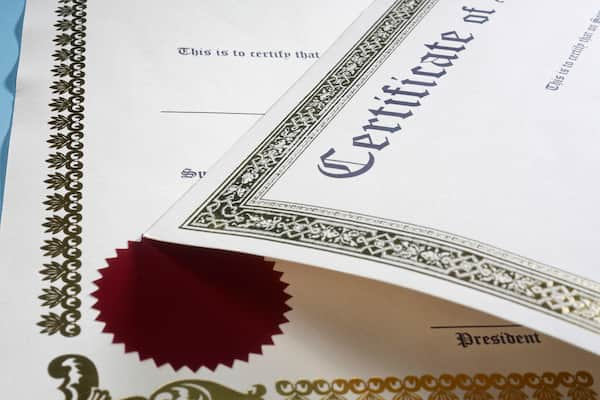
Education and Certifications Required for Yachting
While there isn’t a specific degree required to become a yacht stewardess, there are some basic qualifications and certifications that you’ll need to be eligible to be hired as a yacht stewardess:
- The cost of this course in the United States is typically around $1,000 and takes about 5 days to complete.
- Check with the Maritime authority in your specific country for specific requirements.
- ENG1 Medical Certificate: The ENG1 is another mandatory medical certificate for yacht crew members. It confirms that they are physically and mentally fit to work on a ship. The testing for this cert will involve a health examination by an approved medical practitioner.
- Additional training courses (possibly): Many aspiring yacht stewardesses choose to complete an interior course, which provides valuable training in various aspects of the job, from table setting and service to housekeeping and laundry room management. This makes them more desirable in the job search and may even be an employment requirement for some yacht owners.
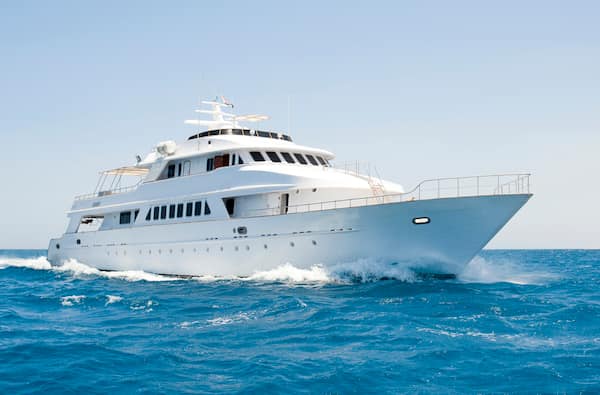
Lifestyle of a Yacht Stewardess
Working as a yacht stewardess can be an exciting and glamorous career, however, it’s important to remember that it also involves long hours and hard work.
You’ll often work 12+ hour days and may be required to be on call 24/7 during busy periods. Living arrangements onboard in the crew house can also be tight, with crew members often sharing small cabins.
Despite these challenges, the lifestyle offers many perks, such as the opportunity to travel to beautiful places, meet new people regularly, and gain invaluable work experience in a very unique industry.
Plus, you’ll have plenty of time off between charters or during the off-season to explore your surroundings and enjoy your hard-earned vacations, and who can complain about that?!

Previous Work Experience
While you can enter the yachting industry with zero experience (aside from the educational requirements above) the industry is extremely competitive.
Having some background in customer service, hospitality, cruise ships, or even high-end restaurants can make you a more appealing candidate to potential employers and yacht owners.
Experience in housekeeping, event planning, or any role that demonstrates your ability to be a team player, showcases your attention to detail, and highlights a strong work ethic will serve you well in your pursuit of a yacht stewardess position.
How To Become A Yacht Stewardess
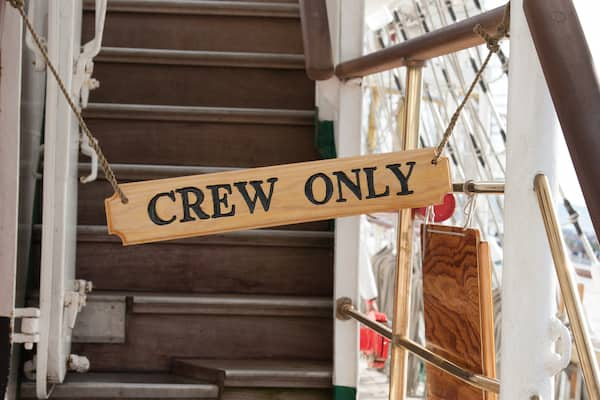
12 Steps To Becoming A Yacht Stewardess
The best way to become a yacht stewardess is to prepare yourself from all angles. Here are the 12 steps to becoming a yacht stewardess.
- Research the yachting industry: Understanding the yachting world is very important for aspiring yacht stewardesses. Educate yourself on various roles onboard (e.g., captain, deckhand, chef, engineer), the types of yachts (motor yachts, sailing yachts, private or charter yachts), and the unique lifestyle associated with working on yachts, such as long hours, tight living quarters, and seasonal schedules.
- Obtain necessary qualifications and certifications: The STCW (Standards of Training, Certification, and Watchkeeping) Basic Safety Training course is mandatory for working on yachts. This course covers essential safety procedures, first aid, and firefighting. Additionally, obtain a medical certificate (such as ENG1) to prove you’re fit for a job at sea.
- Acquire relevant work experience: Experience in customer service based positions is super valuable for yacht stewardesses, as it showcases your ability to provide exceptional service and adapt to a demanding work environment. Gaining experience in restaurants, housekeeping, or event planning can also strengthen your resume.
- Develop your skills and personal qualities: Because the yachting industry is so competitive, it’s essential to showcase adaptability, excellent communication skills, and professionalism. Being a team player, having strong attention to detail, and being able to anticipate guests’ needs before they need them are what yacht owners will be looking for in a stewardess.
- Network with industry professionals: Attend boat shows, yachting events, and join online forums (such as facebook groups) to connect with fellow crew members, crew agents, and yacht owners. Building a strong network can open so many doors to job opportunities and provide various insights into the yachting industry.
- Prepare a strong CV and references: Create a yacht-specific CV that highlights your relevant experience, certifications, and personal qualities that make you an ideal candidate for a yacht stewardess position. (We’ll touch on this more below).
- Register with yacht crew agencies: Reputable crew agencies can help match you with suitable job opportunities. Registering with multiple agencies increases your chances of finding the perfect job.
- Attend boat shows and yachting events: Popular yachting hubs like Fort Lauderdale and Newport host annual boat shows that attract yacht owners and crew members. Attending these events – or even moving to a yachting hub – can help you network, learn about the latest industry trends, and discover job opportunities.
- Be persistent in your job search: You may have to apply for day work or temporary positions on a smaller yacht to gain valuable experience while looking for a permanent role. This can also help you build your resume and make connections within the yachting world.
- Prepare for interviews: You should be thoroughly prepared for your interviews by researching the specific yacht and owner. You also will need to dress professionally, and be ready to demonstrate your passion for the industry. Be prepared to answer scenario-based questions and showcase your problem-solving abilities.
- Accept your first job offer and learn on the job: Be open to starting on smaller boats or even taking temporary positions to gain experience and prove yourself in the industry. Each yacht and crew are unique, so be prepared to learn and adapt as you go. You can use every experience you have as a boost into a more permanent career.
- Keep improving and advancing in your career: Pursue additional courses, certifications (e.g., wine knowledge, flower arrangement), and networking opportunities to grow your skillset and advance in the yachting world. Continuously improving your skills will make you a more desirable candidate for higher-level positions and more prestigious yachts, thus more compensation.
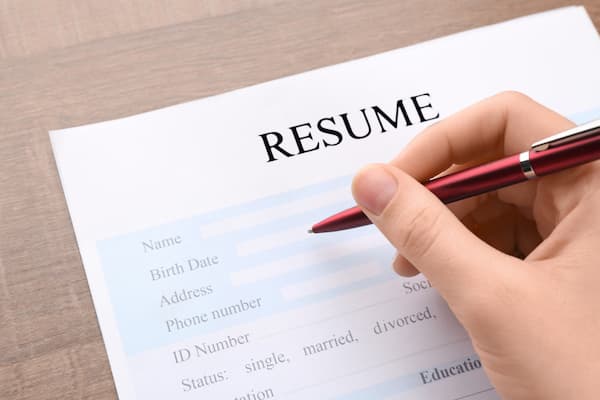
Tips for Crafting the Perfect CV for Your Yachting Job Search
You’ll often hear the term CV as opposed to resume in your yacht job search.
A CV is typically more in-depth than a resume and is often used for academic or research positions or when applying for jobs in Europe and other regions outside the United States (which is often the case with yachting).
Creating a yacht stewardess-specific CV is vital to standing out among other applicants in such a competitive world. Here are some tips to help you craft a CV for your job search:
- Start with a strong personal statement: Summarize your career goals, relevant experience, and personal qualities that make you an ideal candidate for a yacht stewardess position.
- Highlight your yachting qualifications and certifications: List your STCW Basic Safety Training, medical certificate, and any additional courses or certifications relevant to the yachting industry (e.g., interior course, wine knowledge, etc.). This shows your potential employer(s) that you’re serious!
- Show off your relevant work experience: Focus on previous experience in customer service and/or hospitality, or any other industries you have experience that would be applicable to the yacht stewardess role, emphasizing skills like housekeeping, guest service, and teamwork.
- Emphasize your skills and personal qualities: Highlight your adaptability, attention to detail, strong work ethic, and ability to work as part of a team. These qualities are crucial for a successful yacht stewardess!
- Customize your CV (or resume) for each application: Don’t be afraid to switch it up! Customize your CV for each yacht stewardess position, emphasizing aspects that best match the specific job requirements based on the research you’ve done.

Interview Tips for Yacht Stewardess Positions
- Research the specific yacht and owner: Familiarize yourself with the yacht’s size, style, and itinerary to customize your answers and demonstrate that you have a genuine interest in the position.
- Dress professionally and appropriately: You should go for a polished and conservative look that reflects the high standards of the yachting industry.
- Showcase your skills and experience: Just as with your CV, you should highlight your relevant work experience, certifications, and personal qualities that make you the ideal stewardess for the job.
- Be prepared for scenario-based questions: Interviewers may ask how you would handle specific situations, such as dealing with difficult guests or emergencies on board – try to be prepared for them.
- Demonstrate your passion for the industry: Show enthusiasm for the yachting lifestyle and convey your dedication to providing exceptional service to yacht owners and guests.

Yacht Stewardess FAQs
Is it hard to become a yacht stewardess.
Becoming a yacht stewardess can definitely be challenging due to how competitive the industry is.
However, if you’re passionate about it and with a bit of persistence, networking, and relevant experience, it’s certainly achievable.
How do I become a yacht stewardess with no experience?
To become a yacht stewardess with no experience, you should start by completing the STCW Basic Safety Training, acquire a medical certificate, and begin to work towards gaining experience in customer service or hospitality to build a strong foundation.
How do I start a career as a yacht stewardess?
To start a career as a yacht stewardess it’s important to research the industry, obtain necessary certifications, gain relevant work experience, network with industry professionals, and apply for yacht crew positions.
How long is yacht stewardess training?
The good news is that yacht stewardess training, such as the STCW Basic Safety Training, typically only takes around one week to complete.
Keep in mind that each yacht owner may require (or prefer) that additional specialized courses be completed.
What is the average age for a stewardess on a yacht?
The average age for a stewardess on a yacht can vary, but it’s most common to see individuals in their early 20s to mid-30s working on yachts in this role.
How long is a yacht crew shift?
Again, yacht crew shifts can vary, but it’s not uncommon for crew members to work very long hours. Sometimes up to 12-16 hours a day, depending on guest requirements and yacht size.
Do yacht stewardesses work year round?
In general, the yachting industry is more seasonal though the “seasons’ vary based on location. The winter season won’t be nearly as long in some parts of the world as it will be in others.
Do yachties get a salary or just tips?
Yacht crew members typically receive a salary, but on charter yachts, they may also earn tips from guests, which can significantly boost their income.
Becoming a yacht stewardess may seem like a daunting task with many steps and competition, but with persistence, a lot of hard work, and the right attitude, you can absolutely turn your dream job into a reality.
I hope this guide helps you achieve your goals and embark on a thrilling and rewarding career in the yachting world.
More Posts You Might Like
- What to Wear Sailing: The Ultimate List
- The Ultimate Work Capsule Wardrobe Guide
- The 11 Best Designer Tote Bags For Work
- How to Build a Classic Summer Capsule Wardrobe

Emilee is a writer and mom living in Northern Nevada. She enjoys spending her time in the kitchen whipping up new recipes, camping with her husband and sons, and getting her day started with early morning yoga sessions.
Similar Posts

The Best Glamping Accessories & Furniture For Luxury Camping
As an Amazon Influencer, I earn from qualifying purchases. This post may contain Amazon, Rewardstyle, and other affiliate links. That means if you click and buy, I may receive a…

260+ Best Short Instagram Captions To Use In 2023

Beautiful Beach Maternity Photoshoot Inspo & Tips

Maternity Clothes On A Budget : Where To Find Them

All-Natural Yoni Soap Recipe

Back To School Supplies With Walmart
Impartial training and careers advice
Call us: +441983 280 641
+441983 280 641
- Begin a career on a Superyacht
- Career paths
- Become a Steward/ess on a Superyacht
Become a Steward or Stewardess on a Superyacht.
A perfect way to combine work and travel – and you’ll get to spend your time in the sunshine and in some of the most beautiful places in the world.
The Superyacht industry is constantly on the lookout for energetic, hardworking people, male or female, to provide guests and owners with the ultimate holiday experience.
Read on to discover answers to some of the most common questions we’re asked about being a Stewardess on a superyacht…
What qualifications do I need to work on a Superyacht?
- ENG1 medical required by all crew who work at sea. If you are thinking of becoming a Superyacht Steward/ess, then we recommend you complete the ENG1 medical before completing Step 2.
- STCW Basic Safety Training Course is a set of compulsory qualifications required by all crew who work at sea. You will complete a Sea Survival course, First Aid, Fire Fighting (great fun), and topics on Health and Safety, and Security.
- Get some experience . If you have hospitality experience or you have worked as a Nanny, Beautician, Hairdresser or Air Steward/ess, to name a few, then this will look great on your CV.
How do I get a job on a yacht with no experience?
It’s true that you don’t have to have worked on a yacht to start your career as a Steward/ess (apart from the compulsory qualifications mentioned above!).
Like any new career, though, it is a good idea to get some training in the basics so you can hold your own onboard. All yachts run slightly differently so one size does not fit all. To increase your chances of finding a job the more experience you can get the better.
The more experience you can offer the yacht, the better. So, if you don’t have any transferable skills, then Flying Fish can help .
How do I find work on a Superyacht?
There are three ways crew find a job.
- Most crew travel to Antibes, France described as the hub of yachting in the Mediterranean.
- Online, we talk a bit more about “going online” below.
- Contacts. If you know somebody that is already working on a Superyacht then through their connections it is possible to find work.
Almost everybody that is looking for a job on a Superyacht travels to Antibes, France. On arrival, crew tend to stay in a crew house such as the Crew Grapevine used as a base to look for work.
If budget is a concern then crew join forces and rent an Airbnb between them. The advantage of a crew house like the Crew Grapevine is that the owners (ex-yachties) actively help you find a job.
The way you find a job on a Superyacht is quite unique. From your base in Antibes, you would travel to other ports in the local area, walk the dock and chat to the crew working onboard to see if there are any positions available.
Superyacht crew who have the evening off will go to the local bars to unwind. This is the perfect chance to get to know people that are working on Superyachts and to build connections in the industry.
Learn more about it here
Go online to look for work
All Superyacht recruitment agents post positions on their respective websites. Once qualified, new crew would register with the agency and complete their registration form. You would then get in touch with the agent to start searching for that dream job.
The recruitment agent’s job is to match the right candidate for the job being advertised. There are many recruitments agents out there, a quick Google search for “ Superyacht Recruitment Agents ” will bring up a list.
Facebook is another medium that yachts use to post jobs. To keep up to date is it worth joining a couple of the Superyacht Facebook groups. Yacht crew jobs and Palma yacht group are two examples.
Amelia, who trained with Flying Fish in 2020, gave some good advice:
“Sign up to a few good recruitment companies, make sure you interview with the recruiter first rather than using Facebook. Second, when you have your interview, make sure you ask questions about the yacht. This is because you are not only finding a job but a home and family too, so ask as many questions as possible to make sure it’s the right yacht for you.”
How long does it take to find work as a Steward/ess on a Superyacht?
Over the 12 years that we have been running Steward and Stewardess courses, most find a job between one to four weeks. We have had customers that have found a job in a day and others that have taken six weeks to find that perfect job.
The time it takes to find a job is down to you. You will need to be proactive, up early, and make sure you are at the front of the queue. From our experience, people who work hard and explore every opportunity will find a job quickly.
Every Chief Stew that calls us for a reference asks the same questions – does the candidate have a good attitude ? You need to be hard-working, happy to work long hours, and used to mucking in. Have a can-do attitude and a willingness to go that extra mile to help your fellow crew mates.
When’s the best time to look Steward/ess Superyacht work?
Traditionally Superyachts recruit for the Mediterranean season anytime between February to May. That being said, yachts recruit all year round. We have seen many graduates find work in July and August when the season is in full swing.
The next key recruitment period is between September and November as yachts prepare for the Caribbean season. Yachts will cross the Atlantic anytime between December and January to cruise the Caribbean or the US for the winter.
Superyacht crew who have had a busy Mediterranean season may decide to take the winter off, which leaves opportunities for new crew to enter the industry.
How much money does a Steward/ess typically make?
A Steward/ess starting out in the industry can expect to earn €2,000 to €3,500 per month – almost all crew paid in Euros. The salary can depend on many factors, the main one being the yacht’s “crew budget.”
The owner or management company will agree on a budget that the Captain uses to hire crew, which can lead to small variations in the amount yachts pay their crew.
Your salary can also depend on whether you work on a Charter or Private yacht. It is customary for charter guests to tip the crew, the tip is normally around 10% of the charter fee. Chartering a Superyacht can set you back anywhere from €250,000 to €1 million per week.
Tips are split evenly amongst the crew and on average, can be anything from €2,000 – €5,000 per charter.
Is my salary tax-free?
As a crew member (or Seafarer) working on a Superyacht, it is likely that you will be out of the Uk for a significant about of time. Spend more than half of the year abroad then you fall under a specific piece of legislation called the Seafarers Earning Deduction Scheme. As a basic principle, if you are out of the UK for more than 183 days then there is no income tax on income (including tips) from the yacht.
UK Seafarers are required to complete a self assessment tax return each year. Flying Fish are registered tax agents and offer a Seafarers tax service to the yachting industry. We work with hundreds of customers to insure that their Self Assessment tax returns are completed on time.
What is it like working on a Superyacht?
All Superyacht crew work, eat, and sleep onboard. The yacht will become your home, and all meals are provided while onboard. Your contract will specify your duties, salary, working hours, and holiday. The yacht will supply your uniform and provide further training if necessary.
Superyacht crew will be comfortable with being away from their friends and family for long periods of time. For your first job, expect to be away from home for an extended period, which may be six months or more.
There are various roles within the Interior department; Laundry, Service, and Housekeeping. Depending on the size of the yacht will depend on what your role is onboard. For example, large yachts will have a dedicated laundry team, while for a small yacht (35-40M), the Stewardess will do all three.
During a normal week, when there are no guests onboard, you are likely to work five days a week, with weekends off. The structure of your working week will differ from yacht to yacht, but there will be time off to explore and have some well-earned downtime.
What’s a typical working day like for a Steward/ess?
Your working day will typically start at 8:00 am and finish at 6:00 pm, usually six days a week. When on charter, or if the owners are onboard, your work hours will differ. Unsociable hours are common when guests are onboard.
What are the cabin arrangments ?
You will share a cabin with another Stewardess. The cabins are small but comfortable with an ensuite bathroom. There is access to the internet via that yacht’s Wi-Fi system, so you’ll be able to keep in touch with friends and family at home.
Can I make a career in yachting?
Yes, and many have! Becoming a Superyacht Stewardess can be a career, and what an amazing career it can be. Every Stewardess starts out as a Junior Stew; then, as you gain time and experience onboard you can progress to 2nd Stew, then Chief Stew.
The chief Stew runs the entire interior team, manages the budget, and will be the first point of contact for the guests and owners – not an easy role.
Some yachts will employ a Purser , which can be best described as the PA to the Superyacht.
Not only is there progression, but becoming a Superyacht Steward/ess offers the travel and adventure we all seek. You will meet some of the world’s rich and famous and make some friends for life.
So, how do I become a Steward/ess on a Superyacht?
This is where we come in. Flying Fish run a two-week Superyacht Steward/ess course that includes all the qualifications and skills you need to get started in the industry. Everything from the STCW Basic Safety Training to our specialised Interior programme, run by an ex-chief Stewardess.
The course is great fun; you will learn loads of new skills and meet like-minded people who, like you, are thinking about a different career path.
Superyacht Steward/Stewardess Course
Become a steward or stewardess on a superyacht.
Becoming a Superyacht Steward or Stewardess is the perfect way to combine work and travel.
The course is suitable for complete beginners or those with experience who are looking to work as a Steward or Stewardess on a Superyacht.
Want to find out more?
Contact our team at Flying Fish today for information on our Superyacht Steward/ess course, life as a Stewardess, qualification advice and much more!
Alternatively, click on our Superyacht Steward/ess course below and kick start your new career today!
The ultimate guide to working on Superyachts

All guides , Stewardess
How to kickstart your career as a yacht stewardess.
- June 23, 2023
Are you dreaming of a job that allows you to travel the world, work on luxurious yachts, and make lifelong friendships? Look no further! Becoming a yacht stewardess might just be the perfect career choice for you. In this comprehensive guide, we will walk you through the step-by-step process of how to become a yacht stewardess and embark on a thrilling and rewarding journey.
Section 1: Understanding the Role of a Yacht Stewardess
Before diving into the details of how to become a yacht stewardess, let’s first understand what this role entails. Contrary to popular belief, working as a yacht stewardess is not like working on a cruise ship. While cruise ships accommodate thousands of passengers and crew members, yachts are more intimate and cater to a select number of guests.
As a yacht stewardess, your primary responsibility is to provide impeccable and personalized service to the yacht’s guests. Whether it’s ensuring their comfort, attending to their needs, or creating a memorable experience, you’ll play a crucial role in making their time on board exceptional. Additionally, you’ll be responsible for housekeeping, service, laundry, and other tasks that contribute to the overall smooth operation of the yacht.
Section 2: The Benefits of Being a Yacht Stewardess
Working as a yacht stewardess comes with a myriad of benefits that make it an attractive career choice for adventure seekers. Let’s explore some of these benefits:
2.1 No More Daily Commutes
Say goodbye to rush hour traffic and monotonous commutes! As a yacht stewardess, your workplace is constantly changing, and you’ll wake up in a new and exciting location every day. Imagine starting your day on a remote Caribbean island or enjoying a Mediterranean sunrise in the French Riviera. The world becomes your office, and your daily commute becomes an adventure.
2.2 Living and Working with Friends
Working on a yacht means living and working in close quarters with a tight-knit crew. You’ll form deep bonds with your colleagues, creating a unique sense of camaraderie and friendship. When you’re off-duty, you can explore new destinations together, indulge in water sports, or simply relax on the yacht’s deck.
2.3 Great Earning Potential
Not only do you get to travel the world, but you also get paid well for it. Yacht stewardesses can earn substantial salaries, with starting wages ranging from €2500/month and upwards. Depending on your experience and the size of the yacht, you may even receive tips on top of your salary. Some positions may also offer tax-free income, adding to your financial benefits.
2.4 Excitement and Adventure
Life on a yacht is far from ordinary. Each day brings new experiences, whether it’s meeting interesting people, witnessing breathtaking sunsets, or exploring exotic locations. You’ll have the opportunity to attend glamorous events, host cocktail parties, and immerse yourself in the vibrant yachting lifestyle. Brace yourself for a thrilling and ever-changing adventure!
Section 3: How to Prepare for a Career as a Yacht Stewardess
Now that you’re familiar with the role and the enticing benefits of being a yacht stewardess, let’s dive into the steps you need to take to kickstart your career.
3.1 Pack Light and Smart
Before embarking on your yachting journey, it’s essential to pack wisely. As space on a yacht is limited, it’s crucial to travel light. Opt for versatile, lightweight clothing suitable for various climates. In warmer regions like the Caribbean, pack light jackets and comfortable summer attire. If you’re heading to the Mediterranean, consider bringing warmer clothes for cooler evenings. Remember, you’ll be sharing a cabin with limited storage, so choose a foldable bag instead of a bulky suitcase.
3.2 Have the Courage to Quit Your Job
To pursue a career as a yacht stewardess, you’ll need to take the leap and quit your current job. Embrace the excitement and possibilities that lie ahead, and don’t hesitate to leave behind the traditional 9-5 routine. By stepping out of your comfort zone, you open yourself up to new adventures and opportunities.
3.3 Arrive at a Yachting Hub
To increase your chances of finding a job as a yacht stewardess, it’s advisable to be in a yachting hub during peak hiring seasons. The two primary yachting seasons are summer and winter. In summer, yachts flock to the Mediterranean and the North East of the USA, while winter is dominated by the Caribbean. Plan to be in Fort Lauderdale, USA by October/November for the Caribbean season and Antibes, France, or Palma De Mallorca in April/May for the Mediterranean season.
During your time in these yachting hubs, consider staying in crew houses specifically designed for aspiring and experienced crew members. Crew houses offer affordable accommodation, a chance to connect with like-minded individuals, and an opportunity to unofficially start networking.
3.4 Complete Required Training Courses
Before you can work as a yacht stewardess, you must complete essential safety training courses. The most important course is the Standards of Training and Certification of Watchkeeping (STCW 95) or STCW basic safety. Additionally, you’ll need to obtain your Proficiency in Designated Security Duties (PDSD) certification. Look for reputable training schools in the yachting hubs mentioned earlier, such as our agency Remember, networking is crucial during these courses, as you may meet professionals in the industry who could potentially hire you.
3.5 Obtain an ENG1 Medical Certificate
To ensure your fitness for working on a yacht, you need to obtain an ENG1 medical certificate. This certificate is essential and supersedes any other medical examination. Book an appointment with an approved ENG1 doctor in advance, as waiting periods can be lengthy during peak seasons. Fort Lauderdale, being a yachting hub, has several qualified ENG1 doctors to choose from.
3.6 Craft Your Yacht Stewardess CV
When applying for yacht stewardess positions, it’s crucial to have an impressive CV that stands out from the competition. A yacht stewardess CV should showcase your skills, experience, and personality. Make it visually appealing by incorporating color and an attractive layout. Include a professional photo of yourself, an engaging “About Me” section, and details about your availability and current location. Don’t forget to mention your interests and hobbies, as they contribute to your personality and suitability for life on a yacht.
If you need assistance in crafting the perfect CV, consider reaching out to agencies like Yachtie Careers . They offer valuable guidance, STCW training, and other services to help you navigate your path to a successful yacht career.
3.7 Getting Your CV Out There
Once you have a polished CV, it’s time to get it in front of potential employers. There are several avenues you can explore:
- Crew Agencies : Sign up with reputable crew agencies that connect job seekers with yacht captains and owners. These agencies offer a free service, so be cautious of any agencies charging a fee.
- Networking : Yachting industry professionals often host parties and events to promote their brands. Attend these events to network with captains, crew members, and industry insiders. Building connections and showcasing your personality can lead to job opportunities.
- Online Job Boards : Explore online job boards dedicated to yacht positions. Submit your CV directly to interested parties or respond to job advertisements.
Remember, persistence and a positive attitude are key in this competitive industry. Keep refining your CV, attending industry events, and utilizing online resources to maximize your chances of landing a yacht stewardess position.
Section 4: Nailing Your Yacht Stewardess Interview
Congratulations! Your impressive CV has secured you some interview opportunities. Now it’s time to prepare and shine during the interview process.
4.1 Dress the Part
First impressions matter, so dress professionally and appropriately for your yacht stewardess interview. Opt for a tidy hairstyle, light makeup, and a polished appearance. Wear a polo shirt paired with a skirt, skort, or shorts in navy, black, or beige. As interviews often take place on yachts, it’s acceptable to wear flip flops or boat shoes, as you’ll be expected to remove your shoes before boarding.
4.2 Show Your Personality
During the interview, the interviewer wants to assess your compatibility with the existing crew. Let your personality shine by being friendly, enthusiastic, and confident. Demonstrate your willingness to learn new skills and adapt to the yachting lifestyle. Remember, the interview is not only about your qualifications but also about your ability to fit seamlessly into the dynamic yacht crew environment.
4.3 Highlight Your Transferable Skills
Even if you don’t have previous yachting experience, you likely possess transferable skills that are valuable in the industry. Emphasize your customer service abilities, attention to detail, and organizational skills. Mention any relevant experience in hospitality, event planning, or personal assistance. Your ability to provide exceptional service and meet guests’ needs is highly sought after in the yachting world.
4.4 Ask Thoughtful Questions
At the end of the interview, the interviewer will typically ask if you have any questions. Take this opportunity to show your genuine interest and curiosity about the role and the yacht. Ask about the yacht’s schedule, the current crew’s dynamics, and any specific details about the job. Thoughtful questions demonstrate your engagement and enthusiasm for the position.
Section 5: Embracing Life as a Yacht Stewardess
Congratulations! You’ve successfully landed a job as a yacht stewardess. Now it’s time to immerse yourself in this exhilarating and unique lifestyle.
5.1 Adjusting to Shared Spaces
As a yacht stewardess, you’ll be sharing living quarters with your fellow crew members. It’s essential to adapt to the shared spaces and practice good etiquette. Respect your crewmates’ belongings, keep shared areas clean, and be considerate of others’ schedules. Living harmoniously with your crewmates contributes to a positive work environment and enhances everyone’s experience on board.
5.2 Embrace New Experiences
Working on a yacht grants you access to extraordinary experiences and breathtaking destinations. Embrace every opportunity to explore new places, try new activities, and meet interesting people. Participate in water sports, attend glamorous events, and enjoy the stunning sunrises and sunsets that accompany life on a yacht. This is your chance to live life to the fullest and create memories that will last a lifetime.
5.3 Continuous Learning and Career Development
As a yacht stewardess, there is always room for growth and improvement. Take advantage of training opportunities and seek out additional certifications to enhance your skills. The yachting industry values continuous learning, so invest in your professional development to advance your career. Stay updated on industry trends, attend workshops, and network with fellow professionals to expand your knowledge and open doors to new opportunities.
Becoming a yacht stewardess is a thrilling and rewarding career choice for those seeking adventure, travel, and a chance to create lifelong friendships. By following the steps outlined in this guide, you can embark on a journey that allows you to explore the world, provide exceptional service, and embrace a unique lifestyle. So pack your bags, get ready to set sail, and make your dreams of becoming a yacht stewardess a reality!
Remember, for more assistance and guidance on your path to a yachting career, consider reaching out to Yachtie Careers . We offer STCW training and comprehensive support to help you navigate the complexities of the industry.
Safe travels, and enjoy your incredible journey as a yacht stewardess!

Yacht Deckhand Premium STCW

Yacht Stewardess Premium STCW

Yacht Stewardess Full STCW

Superyacht Deckhand Full STCW

Top 10 best places to find a Yacht job in the Med 2024?

Dockwalking Yacht Crew guide

Yacht Crew Salary 2024

Yacht Stewardess Salary 2024

Yacht Deckhand Salary 2024
Best superyacht training in germany – yacht crew, superyacht crew training europe.

3 next bookings get 50€ free. Use free code “yachtie50” at checkout.
2 next bookings get 50€ free. Use free code “yachtie50” at checkout
Get free yacht cv and yacht job offers

Yacht Stew/Stewardess Training Courses
Essential stewardess courses to distinguish you in the competitive market.
Essential Superyacht Stew/Stewardess Qualifications:
Certain training courses are essential for you to qualify for employment onboard certain types of yacht and superyachts. Additional training, specific to the role of the steward(ess) is beneficial to those who are new to the industry, would like to refine and broaden their skill set, or to those who would like to progress in their career as a yacht steward(ess).
Below is a list of courses you should complete as essential yacht stew/stewardess training in order to meet the general employment requirements for both private and commercial superyachts.
- STCW Basic Training
- Food Safety & Hygiene Level II
- Proficiency in Security Certificate

STCW Basic Safety Training
In order for you to legally obtain a job on a commercial superyacht (over 24m) you have to be certified with all four basic safety training modules, which are as follows:
- Personal Survival Techniques | PST (A-VI/1-1)
- Fire Fighting Fire Prevention | FFP (A-VI/1-2)
- Elementary First Aid | EFA (A-VI/1-3)
- Personal Safety and Social Responsibilities | PSSR (A-VI/1-4)
STCW Basic Training courses can be booked on an individual bases or booked in combination with other essential deckhand courses. You can find out more about STCW Basic Training , connect with an STCW Basic Training Centre near you , or continue to other deckhand safety training courses below.
*Although this is a commercial requirement, it is generally seen as a requirement for employment onboard private vessels by yacht owners, captains, management companies or flag states. Failure to obtain STCW Basic training can severely limit employment opportunities.
Find out more information about the STCW Basic Training
Find an STCW Basic Training Course / school near me
Food Safety / Food Hygiene Level 2 Certificate:
All MLC complaint vessels require staff involved in food handling and catering activities on board to hold a recognised food safety certification. Due to the fact that there are a number of awarding bodies, accepted by different flag states, you are likely to encounter variations in this course. It is important to ensure that a) the course that you choose is MLC compliant and b) accepted by the flag state that you choose to work under. In order to meet the requirements of the majority of flag states, including the UK Maritime & Coastguard Agency, it is recommended to pursue an MCA approved version of the course.
We have ensured that the training providers listed for this course on My Crew Kit are approved by or accepted the MCA. You can find out more information about the course and find an in class or online version of the class on the link below:
MCA Approved Food Safety / Hygiene in Catering Level II

Proficiency in Security Awareness / Duties Certificate
(STCW A-VI/6-1) & (STCW A-VI/6-1)
In order to work on an ISPS-compliant vessel, an STCW proficiency in security certificate is required. Proficiency in Designated Security Awareness (PSA) is the minimum requirement, whereas Proficiency in Designated Security Duties (PDSD) is required for crew who are designated security duties on such vessels.
Both courses can be done in class or online. *ISPS complaint yachts are commercial yachts larger than 500GT (Usually commercial yachts +50m in length)*
Find out more about the PSA & PDSD STCW Certifications and connect with a training provider, or continue reading about further deckhand training below.
Find a PDSD course
Additional / Beneficial Yacht Stew/Steward(ess) Qualifications:
These are additional courses and certifications specific to the duties associated with a yacht steward(ess).
Introductory Superyacht Stewardess Course:
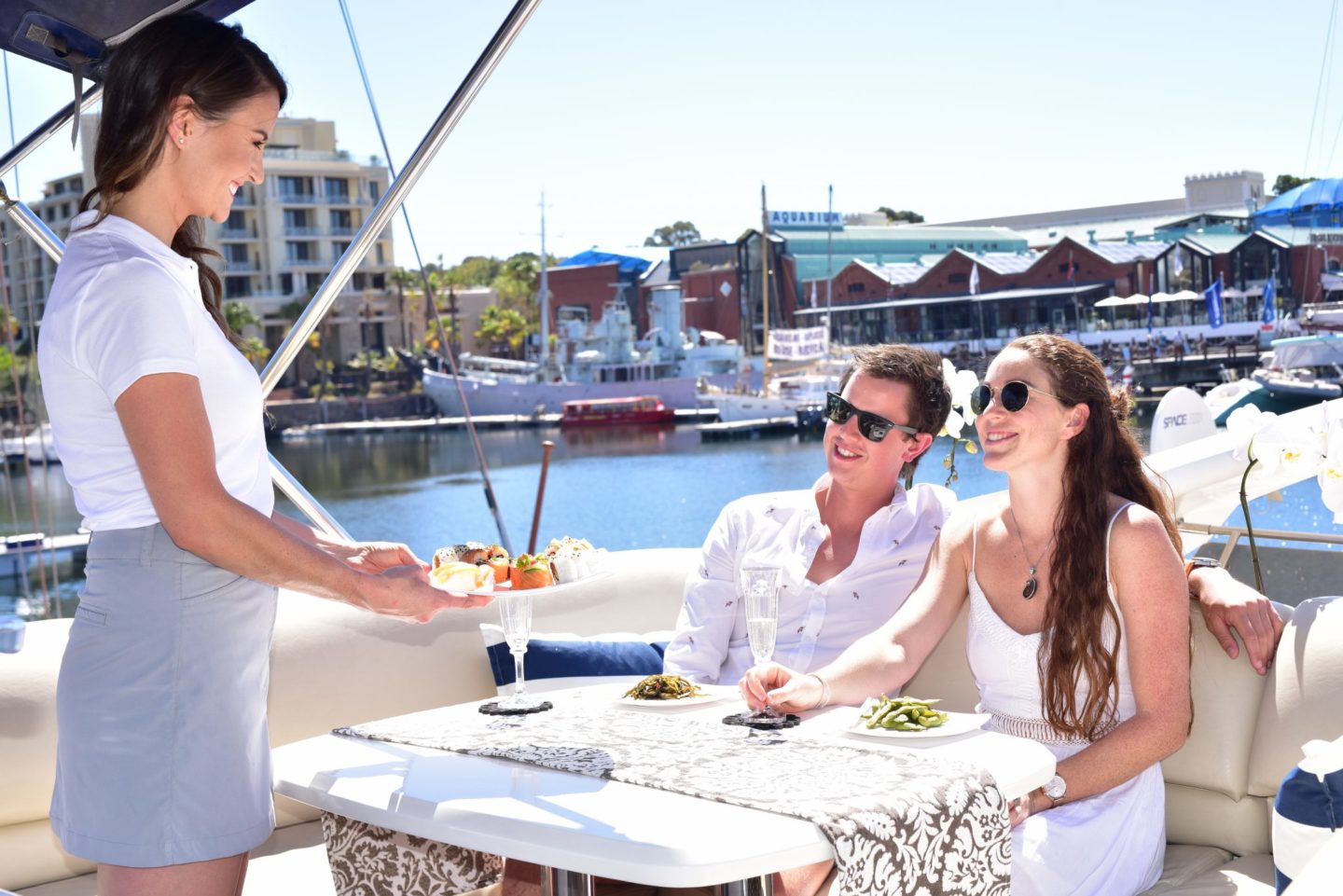
This yacht stewardess crash course will better prepare you for the industry and teach you some basic skills and principals. Usually grouped with the above essential courses and offered as a combined training package. Stewardess courses are useful for people with no transferable skills that are unfamiliar with the industry. Although these courses are helpful and should improve your chances of gaining employment, they may not necessarily be accredited or internationally recognised. Although the Syllabus is dependant on the training provider, similar topics are usually covered. These yacht steward(ess) courses are available in both online and in-class formats.
Find a Recommended Superyacht Stewardess Course Training Provider
GUEST Hospitality Steward / Stewardess Training Program:
The G.U.E.S.T Hospitality program is accredited by the International Association of Maritime Institutions (IAMI) who are recognised by the UK Maritime & Coastguard Agency (MCA). The program provides interior yacht crew with a clearly defined training routes upon which to grow a career upon. The hospitality program, tailored towards the role of the yacht steward(ess) is comprised of three levels of assessment ( Introduction , Advanced & Management Level) as well as specialist modules for specific duties.

The Hospitality Introduction Program is appropriate for entry level crew and consists of four modules that are as follows:
- Unit 23: GUEST Introduction to Yachting & Yachting Life
- Unit 32: GUEST Basic Housekeeping & Laundry Service
- Unit 02: GUEST Basic Food & Beverages Service
- Unit 03: GUEST Basic Wine, Bartending & Mixology
Additional training, information and topics deemed as appropriate by the training provider in question may be included with the packages and/or modules offered. Both online and in-class training options are available.
Find Out More / Connect With a Training Provider
Hospitality Specialist Training Modules are available for those who would like to refine specific skills.
- Unit 06 | Cigar Services
- Unit 10 | Floristry & Plant Maintenance
- Unit 11 | Barista & Hot Beverages
- Unit 12 | Advanced Wine Appreciation Module 1
- Unit 13 | Advanced Wine Appreciation Module 2
- Unit 14 | Advanced Bartending & Mixology Module 1
- Unit 15 | Advanced Bartending & Mixology Module 2
Power Boat Level II :
Many yachts, especially those less than 50m, may require a stew to drive a tender from time to time, it can, therefore, increase your employability on smaller vessels.
Find a Power Boat II training course
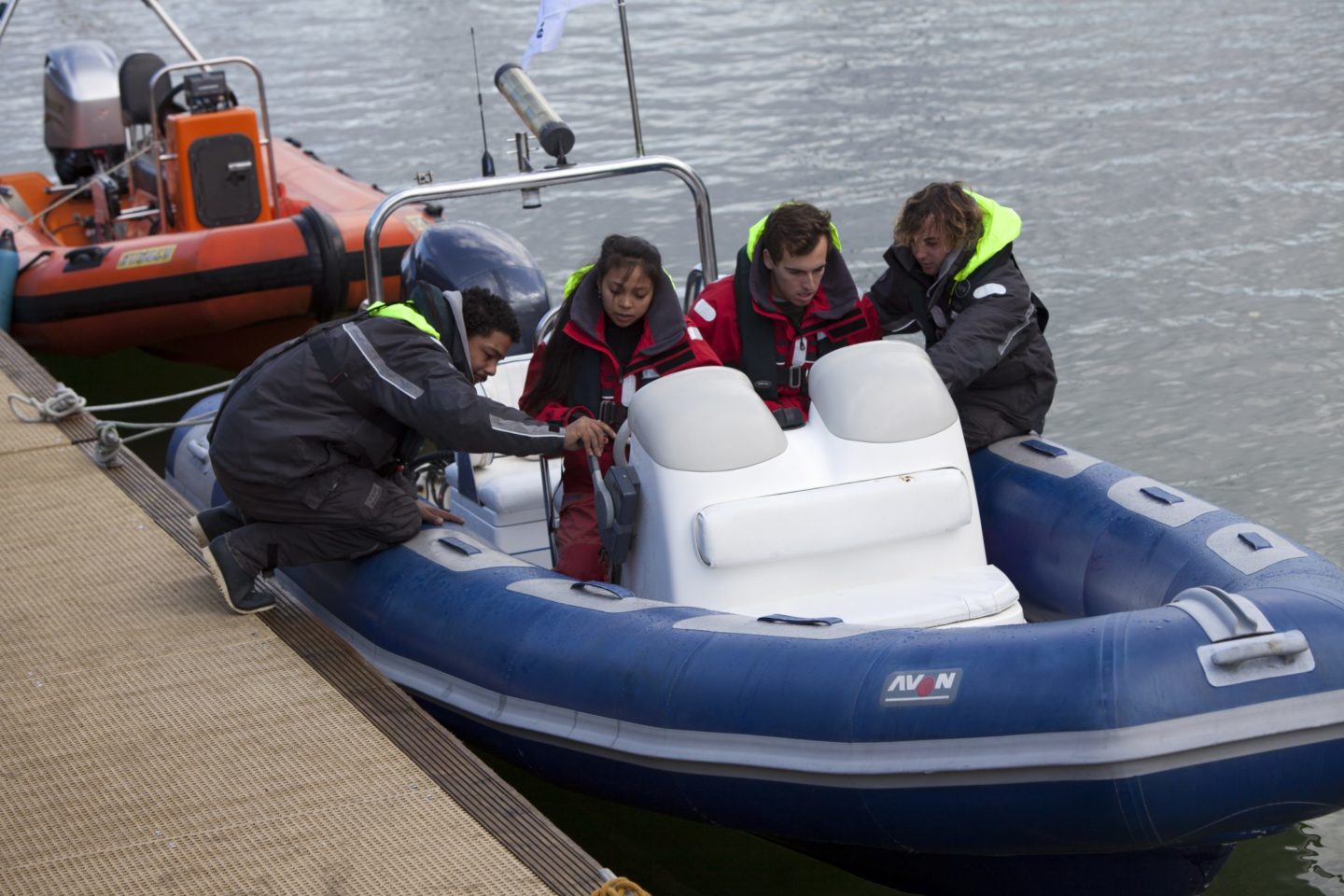
WSET Wine Training
The Wine & Spirit Education Trust provides globally recognised education and qualifications in wines, spirits and sake, for yacht crew who have service-related roles.
Find a WSET Training Centre
Transferable Skills and Training:
Previous jobs or training that you have experienced may be positive to your yachting skill set. Have you worked or training as a waitress/waiter, beautician, hairstylist, makeup artist or masseuse/masseur? Training and skills such as these will compliment your yacht stewardess training and boost your chances of finding a job on a yacht.
Find out more about transferable skills / move to step 3

Find Steward(ess) Training Near you:
Find stewardess training courses in the selected countries below. You can refine the location on the results page.
South Africa
United Kingdom
United States
View All Regions
Yacht Steward(ess) Training in South Africa:
Find training courses in Durban or Cape Town , South Africa or connect with a featured training provider below:
Trilogy Luxury Training
Yacht steward(ess) training in the united states:.
Find training courses in Fort Lauderdale, Miami, Cape Canaveral & Orlando Florida on the links below or view all stewardess training providers in the United States.
Savvy Maritime Academy
Fort lauderdale, yacht steward(ess) training in france.
Find superyacht stewardess courses in Antibes and Cannes or view all stewardess training providers in France.
Yacht Steward(ess) Training in the United Kingdom
Find superyacht stewardess courses in Antibes and Cannes or view all stewardess training providers in The United Kingdom

Yacht Steward(ess) Training in Spain
Palma de mallorca.
Username or Email Address *
Remember me Lost your password?
Username or Email
Get New Password
Be a superyacht steward or stewardess
Considering working in superyacht hospitality.
Are you a young person working in the hotel/hospitality industry but looking for something more? Then you’re already well-placed to transfer your skills into the superyacht industry. With the expansion of wealth in places such as India, Russia and China, the superyacht industry is full of employment opportunities.
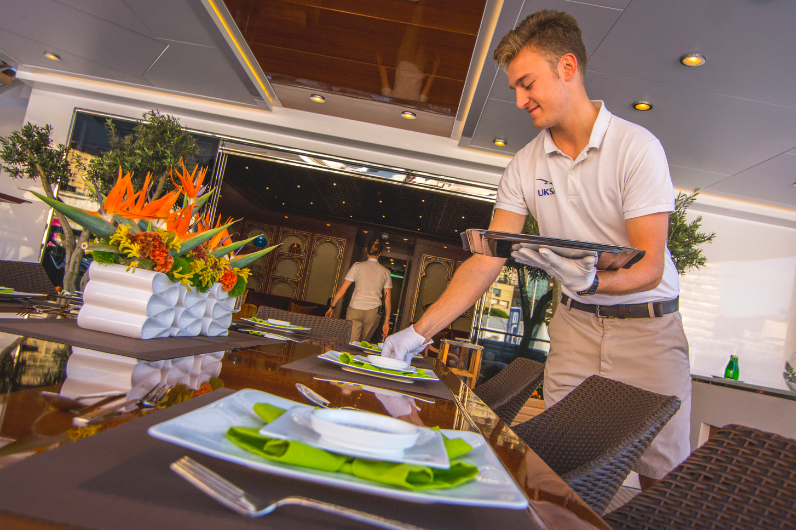
Those who want to spread their wings and see the world will find the lucrative world of superyacht ‘interior’ a good career move in terms of earning money, travelling, and upskilling to provide superior levels of service onboard.
Are you attracted by the thought of providing 7-star service onboard the world’s most elegant superyachts? Perhaps you are looking for a more lucrative alternative to university , or you need something fulfilling to do on a gap year ? If you like the sound of the hospitality industry and want to begin your career, this could be the life for you.
What is the role of a Steward or Stewardess?
Steward or Stewardess is an entry-level position – you will be under the supervision of a Chief Stew. Your duties depend on the size of the yacht and the crew, and the workload depends on the yacht size, time of year and whether there are any guests.
What are the day to day tasks?
Day to day, your role and responsibilities will vary. Your duties will include everything from providing meals and drinks, silver service, laundry and flower arranging to taking care of guests. Fundamentally, your job will be to ensure that the interior of the yacht is pristine and that the guests are happy at all times.
Forget the idea of “work hours”… work can come at any time, day or night. Days are often long and hard, but your time off will be well worth the wait. Be open minded, flexible and ready to accept new and varied challenges each day.
Personality traits
What kind of person do i need to be.
You’ll need to be hardworking, enthusiastic, energetic and a perfectionist with a love of luxury and a desire to see the world. You will engage with the yacht owners and guests more than any other crew member so you will need to be sociable and confident.
Skills required
What skills or experience are required.
There are no specific qualifications, but a background in food and drink, hospitality and catering or customer service is an advantage.
Yacht Stewardess:
On a small yacht there may be just one Stewardess. As well as housekeeping, you could be expected to help with anchoring, mooring and deck operations. On a larger yacht there can be upwards of five Stewardesses whose job is to keep the yacht pristine at all times. Basic duties could be cleaning, bartending and close attention to housekeeping details; on larger yachts there may be a separate Head of Housekeeping.
As a Steward or Stewardess you must be prepared to work hard and be friendly and presentable at all times. Previous experience of hospitality is useful but most important is a can-do attitude and the ability to think on your feet. Your training will give you a level of expertise and attention to detail and so provide you with transferable skills; you will be well-paid and work in some of the world’s most prestigious locations. You will be able to network with a wide range of influential people which could provide opportunities you may never have dreamed of!
What other roles are there?
Other roles including Head of Housekeeping may oversee the entire interior department and reports directly to the Captain. Extra responsibilities could include arranging guest trips and obtaining currency for different locations. Skills will usually have been developed through experience as a Stewardess – you will need meticulous attention to detail, discretion and an ability to anticipate the requirements of every guest.
How much could you earn as a Hospitality Steward/Stewardess?
For this entry level role, you will earn a great wage of on average €2,500 per month (tax free), often with generous tips on top! With clear career progression along a structured route, there’s plenty of opportunity to make this a rewarding, lifelong career.
On small yachts the role of Purser is covered by the Chief Stewardess but on larger yachts, a Purser is often employed separately to manage finances and recruitment. Duties include bookkeeping, accounting, payroll, managing the inventory and organising supplies. The Purser also coordinates delivery contracts and manages guest transport to events and venues. On larger yachts where Chief Stewardess and Purser are separate roles, a Purser can earn between € 7,000 and €8,000 per month .
* These salary guidelines are based on the current yachting market as of January 2018. Actual salaries will always vary depending on a candidate’s specific experience, training, certification, and additional skills – as well as a particular yacht’s needs. Data provided by Camper & Nicolson International
Career prospects
What career prospects will there be for me.
Working in this elite industry will teach you skills you wouldn’t learn in an average hospitality role. You will be networking with a wide range of influential people from all walks of life, opening up opportunities you may never have dreamed of! Your training will enforce a level of expertise and attention to detail that will set you up for any career. Skills are highly transferable into many industries.
There are excellent career opportunities for well-informed, hard-working stews who are passionate about their work. As you become more experienced you could move into a Chief Steward or Stewardess role, or perhaps become a purser if you’re interested in the finances and general management of the yacht and its crew.
Why should I do my hospitality training at UKSA?
If being a Steward or Stewardess sounds perfect for you, or someone you know, tell them about UKSA. We’re a maritime training provider based right on the waterfront in Cowes and we offer a range of courses that will give you the qualifications, information and contacts you need to start work in the superyacht and wider maritime industry.
Our Superyacht Stewardess Training Course lasts just three weeks and will teach you the specific hospitality skills needed onboard a superyacht. The course is taught by industry-renowned Vanessa Hodgson who has designed the perfect training programme to send you into the superyacht industry armed with the essential tools to excel.
You will receive a range of qualifications including food safety, fire prevention and first aid, and you will receive training for the ENG1 medical certificate and STCW basic safety training – both are mandatory for crew on large yachts.
Feel supported during and after your training
We have a support service provided exclusively for UKSA career course graduates. It includes:
- an exclusive online recruitment service;
- practical help with your CV;
- the provision of your online profile for employers to view;
- access to top industry employers, industry knowledge and wide-ranging careers support;
- one-to-one professional mentoring throughout your course.
Our Industry Guidance team will support you through all aspects of your training – the team began their careers at UKSA and so have insider knowledge of the industry. We believe in offering more than just a syllabus and exam passes – we aim to put you in the best position possible at the end of your training to ensure success in your chosen career.
Register your interest
- First name *
- Last name *
- How did you hear about UKSA? * –None– Campaign Dinghy Show Educational Visits UK Event GroupAccommodation.com Guardian Media IOW College IOW County Press London Boat Show Online PlanMySchoolTrip.co.uk Press Radio Referral School Travel Organiser Social Media Southampton Boat Show Top School Trips UKSchoolTrips.co.uk Visit IOW Yachts & Yachting
- General notes
- Opt-in to receive course information and relevant offers
- Accept Privacy Policy and Terms and Conditions .
- Phone This field is for validation purposes and should be left unchanged.
If you have any questions or need to get in touch:
Speak to UKSA on +44 (0)1983 294941 or email us
How To Become A Yacht Stewardess - The Art Of Luxury Hospitality
In this article, we will talk about how to become a yacht stewardess and more. If you have a passion for travel, a flair for hospitality, and a desire to work in a dynamic and luxurious environment, pursuing a career as a yacht stewardess might be the perfect choice for you.
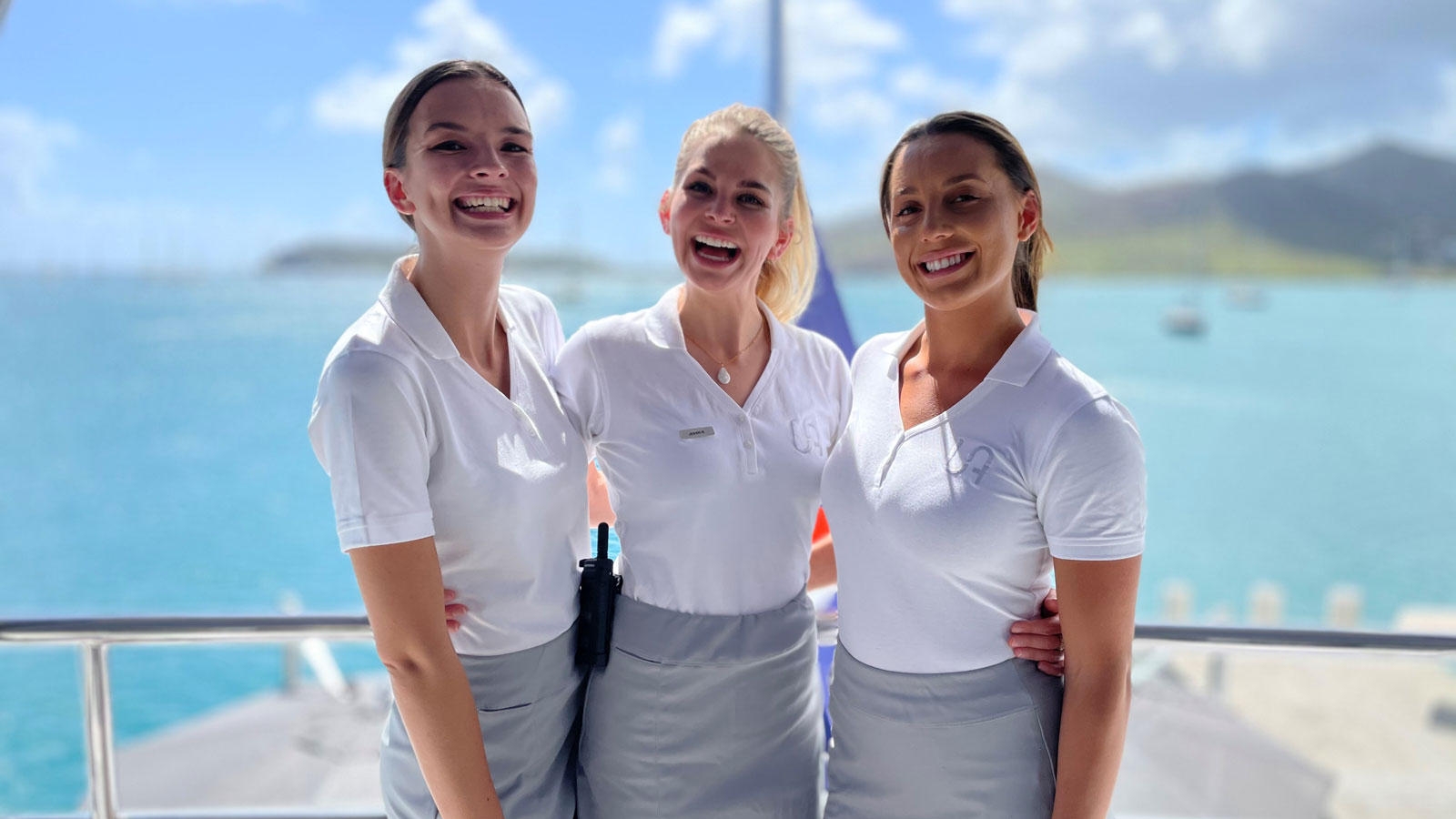
.bwwcfb-y51p0m{color:inherit;font-size:inherit;-webkit-text-decoration:none;text-decoration:none;text-decoration-thickness:1px;}.bwwcfb-y51p0m:hover{-webkit-text-decoration:underline;text-decoration:underline;}.bwwcfb-y51p0m:hover::after{content:" #";opacity:0.6;-webkit-text-decoration:none;text-decoration:none;} Career As A Yacht Stewardess

The Role Of A Yacht Stewardess
- Guest Services - Providing personalized guest services is a crucial aspect of a yacht stewardess's role. They assist guests with their belongings, offer guidance on yacht facilities, and ensure their comfort and satisfaction throughout their stay.
- Table Service - Yacht stewardesses are skilled in the art of fine dining service. They set elegant tables, serve gourmet meals and beverages, and cater to individual dietary preferences with precision and flair.
- Event Planning - From intimate cocktail parties to extravagant soirées, yacht stewardesses excel in event planning and execution. They coordinate every detail, from decorations and entertainment to menu selection, to create unforgettable experiences for guests.
- Inventory Management - Stewardesses are responsible for inventory control, ensuring that supplies, provisions, and luxury amenities are well-stocked. They work closely with the yacht's chief stewardess or purser to manage budgets and procurement.
Skills Required
- Exceptional Communication - Effective communication is key to understanding and meeting guests' needs. A stewardess must possess excellent interpersonal skills to provide personalized service and build rapport with guests from diverse backgrounds.
- Attention to Detail - A keen eye for detail is vital to maintaining the luxurious ambiance of the yacht. Stewardesses must pay attention to every aspect of interior aesthetics, cleanliness, and service, ensuring perfection in even the smallest details.
- Multitasking Abilities - Working onboard a yacht demands the ability to juggle multiple tasks simultaneously. Yacht stewardesses must efficiently manage their time, prioritize responsibilities, and adapt to changing circumstances to ensure seamless operations.
- Professionalism and Discretion - A yacht stewardess must uphold the utmost professionalism and discretion at all times. They often work closely with high-profile individuals, and it is crucial to respect privacy, maintain confidentiality, and handle sensitive situations with tact and grace.
- Adaptability and Resilience - The yacht industry is dynamic and fast-paced. Stewardesses must be adaptable, ready to embrace challenges, and adjust to the demands of guests and the ever-changing itinerary.
Become A Yacht Stewardess

How to become a YACHT STEWARD or stewardESS! (Your step-by-step guide)
- Gain Relevant Experience and Qualifications - To become a yacht stewardess, start by gaining hospitality experience in upscale establishments and consider pursuing formal education in hospitality management. Enroll in industry-specific courses like STCW Basic Safety Training to learn essential safety protocols.
- Build Nautical Knowledge and Skills - Familiarize yourself with yachting terminology, etiquette, and develop proficiency in watersports. Acquiring basic culinary skills can also be beneficial for the role.
- Create a Professional Yachting CV - Craft a well-structured CV that highlights your relevant experience, qualifications, and skills. Tailor it for each application and include references from previous employers.
- Networking and Job Applications - Attend yachting events and job fairs to network with industry professionals. Register with reputable crew agencies and utilize online job platforms dedicated to yachting careers.
- Prepare for Interviews and Trials - Research yachts and owners before interviews or trials. Dress professionally, maintain a positive demeanor, and use trial periods to demonstrate your skills and adaptability.
- Continual Professional Development - Consider obtaining advanced certifications and embrace on-the-job training. Stay connected with industry professionals through networking events and conferences to expand your knowledge and career prospects.
Required Courses

What Qualifications do you need to become a Yacht Stew?
STCW Basic Safety Training
Food and hygiene certification, wine and beverage courses, interior introduction and service courses, silver service training, personal survival techniques (pst) and life raft training, best seasons to seek yacht stewardess jobs.

Mediterranean Season
Caribbean season, crossover seasons, worldwide events and yacht shows, off-season considerations, people also ask, what are the main responsibilities of a yacht stewardess, how much do yacht stewardesses typically earn, are there any specific height or weight requirements to become a yacht stewardess, final words, .bwwcfb-1mysgrz{display:-webkit-box;-webkit-line-clamp:1;-webkit-box-orient:vertical;overflow:hidden;-webkit-line-clamp:2;} career as a yacht stewardess.

Keep up to date with Smart Move
How to Become a Yacht Stewardess: Everything You Need to Know About the Job
Posted on: 11/26/2018

The annual salary for a yacht stewardess starts at around $40,000 plus tips. While that may not seem like a lot to some, while you are living on the ship all of your expenses will be covered by the charter guest.
Being a yacht stewardess is a great way to see the world, meet incredible people, be fed every meal by a great chef, and live a more present lifestyle free of cell phones and constant connection. Away from your family and friends on the open water, you will find peace and adventure.
Read on to learn how to become a yacht stewardess and begin your dream career today.

How to Become a Yacht Stewardess: The Education Requirements
If you want to land a job as a stewardess, you will need to take some short courses that ensure safety and good service on the yacht.
If you are looking for an entry-level position, then you will take the most standard courses, while those looking to become a chief stewardess will have to go back to school for further certifications.
When you are first getting started in the yachting industry, you will need to complete an STCW certification course at an academy like the Maritime Professional Training Academy in Fort Lauderdale.
This course costs around a thousand dollars and is typically completed over about a week-long time range.
How Hard is it to Get Hired as a Stewardess?
Getting hired as a stewardess aboard a yacht is generally not considered to be difficult. Once you have your STCW certification, you will be legally qualified to take a position.
In order to get a job, you should move to a major port city. In the United States, nine times out of ten that is going to mean Fort Lauderdale. Your other option is Newport in Rhode Island. While there are other cities in the country where you may be able to find a position, these hotspots are the best place for those new to the industry to scoop up work.
Once you land in the city, you can hit the docks with your resume looking for people who need to fill positions. In this industry, when you need someone, you need them now, so be prepared to start as soon as the next day.
If you have any hospitality experience such as bartending or entertaining guests, this is helpful to list on your resume.
What Time of Year Do They Hire in Fort Lauderdale?
To get hired as a stewardess, you should head to Fort Lauderdale in between seasons. This is where you will find the most stationary yachts giving you the best chance of landing a position.
There are two primary yachting seasons - summer and winter. To get hired for the summer season, you will need to be in Fort Lauderdale between April and June. For the winter season, you should arrive between September and mid-December.
These down-times are when yachts are in port preparing for the next season and you will be able to set up interviews with many different ship captains or owners at one time.
Those are also the months that you would have off once you become part of a crew while the yachts are repaired and maintained for the next season.

What Do I Do if I Don't Get Hired There?
When you are new to the yachting industry (the term is "green"), you may find it difficult to secure a position. When you begin asking around for advice, many experienced crew members will tell you to head to St. Martin to look for work.
St. Martin is where many of the yachts head and make a port out of for the season. If you are there you can often find positions that crop up from other stewardesses who didn't work out or were unable to fulfill their obligation.
In order to do this, you will need to purchase a round-trip ticket in order to get through customs. You can cancel your returning flight at a later date if you find a position.
If you choose this route, be cautious when you talk to customs people at the airport. Don't tell them that you are coming to look for work. It can raise a lot of questions and prevent your entry in some cases. Just like how people coming to America aren't able to work, there are similar visa requirements for the island.
However, since you will be hired aboard an international vessel, those laws won't apply to you. But trying to explain all of that to an ornery customs agent isn't the best way to spend your first twelve hours in the city.

Consider Registering with a Crew Agency
One of the best ways to find open positions aboard yachts is by registering with a crew agency. They will be able to pair you up with openings and act as an advocate on your behalf.
Before you hit the agency, make sure you spruce up your resume. You need to sell your abilities and talents to potential captains.
These agencies typically don't require any fee from you to join, so you might as well give it a shot. The agencies are paid by the ship captains once they agree to your placement.
If you go with an agency, you will still need to attend individual interviews and secure the position in the same way you would if you found it on your own. It's just a great way to aggregate leads and provides a lot of exposure for your resume bringing you more potential opportunities.
To stay on an agencies books, you will need to check in with them weekly while you are in between gigs. This is so that they can ensure that you are still available. Once you find placement, you will be required to check out.
Make sure you follow through with doing this or you may find it difficult to work with the same agent when you are in need of work again.
Networking Tips
Once you move to town, you will need to begin by walking the docks and meeting people. Dress professionally and make friends, this is a social industry where the right recommendation can go a long way.
Be proactive and positive while you network. You need to be confident in yourself and your ability to find a job if you want anyone else to believe in you.
Useful Skills to Have
While anyone can find a home aboard a yacht with the right attitude and certifications, there are certain skills that will move you up the hiring list.
Those that have basic cooking skills, experience babysitting, formal service training, experience working in a bar or food service, mechanical experience, carpentry skills, and diving experience will all find it much easier to find work and they can also help you command more pay.
How to Secure the Most Pay
When you are first starting out as a crew member, your salary is usually a baseline. Over time, as you gain experience, you will be able to command a higher salary.
Other factors that impact your wage include the size of the boat, the number of responsibilities that you will have, whether the vessel is chartered or for private use, and your ability to make a commitment to being on board long term.
Jobs that offer other benefits like medical and vacation time may offer lower pay as a trade-off, so decide what is important to you before you decide what vessels to head to look for work.

A Note on Commitment
When you step aboard a yacht as a crew member for the first time, you will be very excited and eager to get started. But over time with subsequent charters, you may begin to lose your excitement, especially if your charter guests are particularly difficult or if you get into an argument with another crew member.
While cruising around the world is a dream come true for many, you have to remember that it isn't a vacation. You will be expected to work hospitality hours, which are long and hard and often go late into the night.
You will also have to contend with the personalities of the other crew members and try not to step on anyone's toes, both while you're staying in Fort Lauderdale and on your ship. If you don't have an easy-going personality type, then this may not be the position for you.
Once you take a job on a yacht, you need to make sure that you finish out your contract if you want to find employment anywhere else. Don't allow gossip, bad etiquette and drama to ruin your potential career.
Where to Stay While Finding a Position
Having learned how to become a yacht stewardess, you know your next step needs to be certification and moving to Fort Lauderdale to find a position.
Check out these great listings for a safe, affordable place to stay .
- PRO Courses Guides New Tech Help Pro Expert Videos About wikiHow Pro Upgrade Sign In
- EDIT Edit this Article
- EXPLORE Tech Help Pro About Us Random Article Quizzes Request a New Article Community Dashboard This Or That Game Popular Categories Arts and Entertainment Artwork Books Movies Computers and Electronics Computers Phone Skills Technology Hacks Health Men's Health Mental Health Women's Health Relationships Dating Love Relationship Issues Hobbies and Crafts Crafts Drawing Games Education & Communication Communication Skills Personal Development Studying Personal Care and Style Fashion Hair Care Personal Hygiene Youth Personal Care School Stuff Dating All Categories Arts and Entertainment Finance and Business Home and Garden Relationship Quizzes Cars & Other Vehicles Food and Entertaining Personal Care and Style Sports and Fitness Computers and Electronics Health Pets and Animals Travel Education & Communication Hobbies and Crafts Philosophy and Religion Work World Family Life Holidays and Traditions Relationships Youth
- Browse Articles
- Learn Something New
- Quizzes Hot
- This Or That Game New
- Train Your Brain
- Explore More
- Support wikiHow
- About wikiHow
- Log in / Sign up
- Cars & Other Vehicles
Everything You Need to Know About Becoming a Yacht Stewardess
Last Updated: January 9, 2024 Fact Checked
This article was co-authored by wikiHow staff writer, Finn Kobler . Finn Kobler graduated from USC in 2022 with a BFA in Writing for Screen/Television. He is a two-time California State Champion and record holder in Original Prose/Poetry, a 2018 finalist for the Los Angeles Youth Poet Laureate, and he's written micro-budget films that have been screened in over 150 theaters nationwide. Growing up, Finn spent every summer helping his family's nonprofit arts program, Showdown Stage Company, empower people through accessible media. He hopes to continue that mission with his writing at wikiHow. There are 19 references cited in this article, which can be found at the bottom of the page. This article has been fact-checked, ensuring the accuracy of any cited facts and confirming the authority of its sources. This article has been viewed 5,370 times. Learn more...
If you’re social and love to travel, yacht stewarding might be the perfect career for you! Spending months at a time exploring exotic locations, helping out on the boat, meeting and working with lifelong friends all day long. It’s a job as rewarding as it is exciting. Keep reading and we’ll teach you everything you need to know about becoming a yacht stewardess.
Yacht Stewardess Job Requirements

- SCTW certificates are valid for up to five years. After five years, you must take a fire fighting and sea survival refresher course.
- Make sure your course is certified by a national maritime organization in the country where you complete it.

- Medical conditions that may inhibit you from receiving your ENG1 include, but are not limited to: epilepsy, heart disease, kidney failure, color-blindness, and history of drug/alcohol addiction. [3] X Research source
- If you are working on a small boat operating 60 miles from shore or less, an ML5 will suffice as a substitute for an ENG1.

How to Find a Job as a Yacht Stewardess

- Living near a yacht hub between jobs can be expensive. Look into a crew house - a privately-owned, budget-friendly accommodation where yachties and former yachties live - to stay while you network, complete your training and look for work. [5] X Research source

- Make sure you look presentable while you network. Yacht stewardesses are extremely clean and well-groomed. Dress for the part you want by wearing deck shoes and an appropriate yacht shirt.

- Jobs like bartending, nannying, customer service, and cleaning all look good as these types of duties will be performed on the yacht.
- Look into doing free day work on boats to help build your sea legs and make connections with captains and crew.

- All yacht CV’s list certifications, work history, nationality, spoken languages, body modifications, references, and relevant skills. Some are even more in-depth with details like smoking habits and overall objective. [9] X Research source
- There are several free yacht CV templates online to help ensure yours fits the industry norm.
- Don’t be afraid to play around with the formatting. Your CV should be professional but also as unique as possible.

- Most interviewers are also looking for excellent presentation, leadership, and communication. Make sure to highlight these attributes when you answer their questions. [11] X Research source
You’d Make a Good Yacht Stewardess If…

Benefits of Being a Yacht Stewardess

A Day in the Life of a Yacht Stewardess

Yacht Stewardess Pay

- Yacht stewardesses also have no living expenses since food, housing, electricity, water, even toiletries are provided on the ship. [22] X Research source
- Depending on the countries you sail out of, this can sometimes be tax-free!
- Tips are usually divided evenly among the crew.
Expert Q&A
You might also like.

- ↑ https://www.ypicrew.com/yacht-work-job-qualifications
- ↑ https://uksa.org/what-is-an-eng1-medical-certificate/
- ↑ https://www.flyingfishonline.com/useful-stuff/eng-1-medical/
- ↑ https://slightnorth.com/how-to-work-on-a-yacht/
- ↑ https://www.yachting-pages.com/articles/crew-housing-and-accommodation-in-the-superyacht-industry.html
- ↑ https://yachtstewardess.co.za/how-to-become-a-superyacht-stewardess/
- ↑ https://www.indeed.com/career-advice/resumes-cover-letters/yacht-crew-cv
- ↑ https://www.ypicrew.com/yacht-interview-tips-from-recruiters
- ↑ https://stewardessbible.com/the-interview-process-selecting-the-right-stewardess/
- ↑ https://www.cnn.com/2018/08/23/sport/superyacht-stewardess-spt-intl/index.html
- ↑ https://www.pya.org/News/Crew-Accommodation-in-Large-Yachts.aspx
- ↑ https://expertvagabond.com/yacht-crew-jobs/
- ↑ https://www.flyingfishonline.com/news/is-yachting-a-good-career/
- ↑ https://www.oceaninternationaltrainingacademy.com/working-on-a-yacht?r_done=1
- ↑ https://climbtheladder.com/yacht-stewardess/
- ↑ https://nypost.com/2018/09/03/working-on-a-superyacht-is-like-being-in-a-glamorized-pressure-cooker/
- ↑ https://www.linkedin.com/pulse/what-its-like-work-yacht-crew-nicola-morgan/
- ↑ https://www.luxyachts.com/articles/three-primary-factors-combine-to-determine-the-salary-of-a-yacht-stewardess
- ↑ https://www.businessinsider.com/yacht-stewardess-florida-earns-5000-month-travel-careers-2022-4
About This Article

- Send fan mail to authors
Did this article help you?

Featured Articles

Trending Articles

Watch Articles

- Terms of Use
- Privacy Policy
- Do Not Sell or Share My Info
- Not Selling Info
wikiHow Tech Help Pro:
Level up your tech skills and stay ahead of the curve
EMAIL US [email protected]
- The Company
- Yacht Management
- Projects Management
- News & Trends
- Meet the Team
Understanding Mega Yacht Crew Roles for Plain Sailing
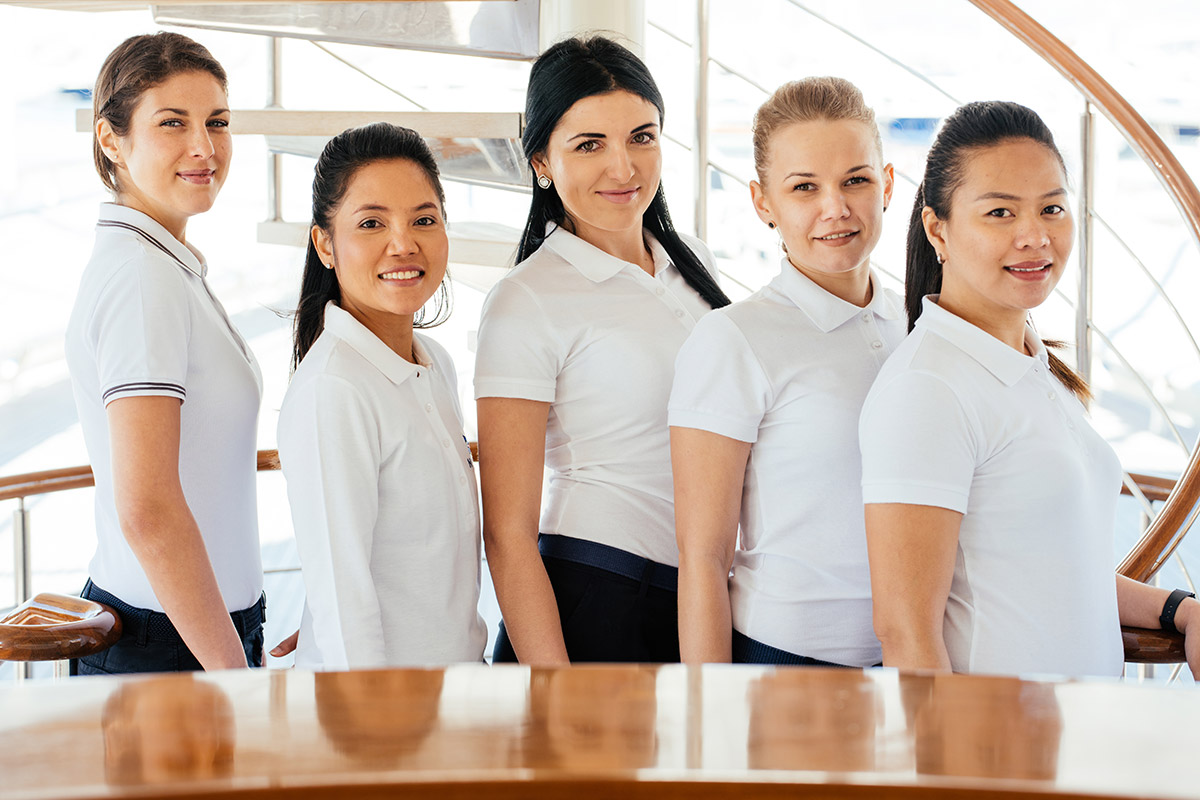
Captain David Butler
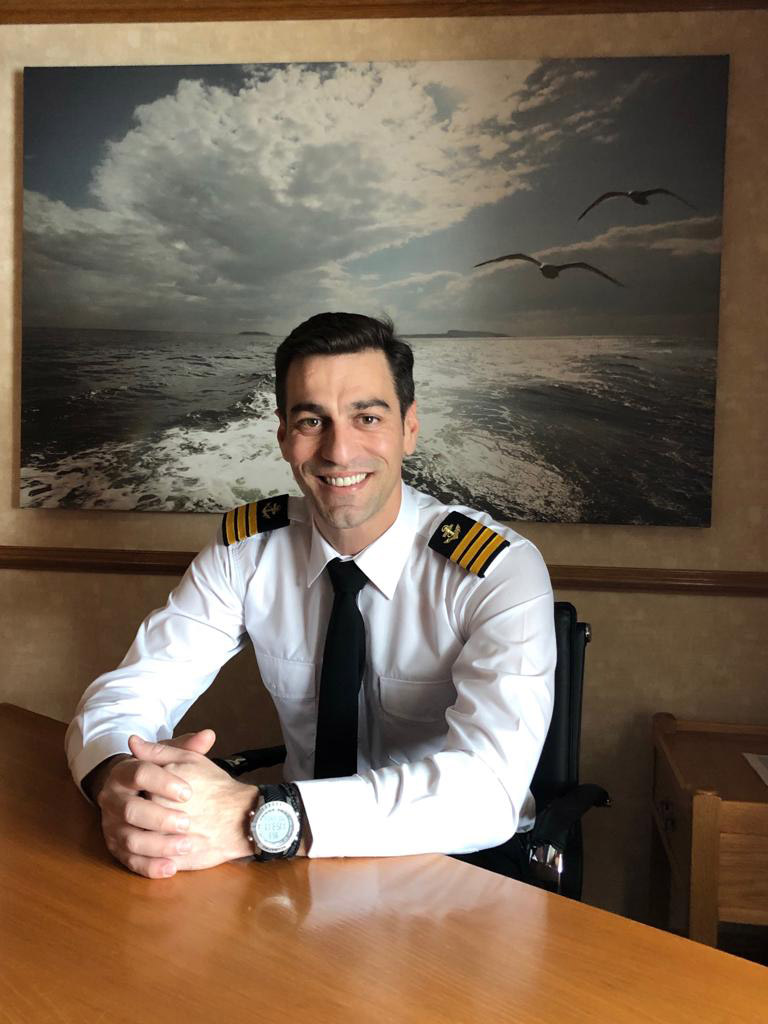
Former Chief Officer George Papafaklis
How Many Crew Members are needed on a Mega Yacht?
There is no short answer to this question as the number of crew depends on many variables. Some smaller vessels may manage with a crew of five, while larger vessels may require a crew of 120 plus. The number of crew depends on the size of the vessel, but also on the services you would like onboard and whether you would like specialist mega yacht crew roles filled onboard. Generally speaking, the crew are segregated into three main departments: the deck department, the engineering department and the interior department.
What Are the Main Mega Yacht Crew Roles?
Deck Department Roles
Captain: the authority onboard, responsible for navigation and passenger safety as well as crew management, budgeting, administration, voyage planning, ensuring regulations are abided by and for planning and arranging refit and maintenance projects. An experienced captain will offer the management skills needed for a harmonious crew as well as for masterfully navigating the waters. Meet Captain David Butler and Manolis Kilmataras
Staff Captain: as second in command beneath the Captain of vessels exceeding 70m+, the Staff Captain will head up the deck department and oversea maintenance, security, navigation and safety of the vessel. They will ensure that the Captain’s orders are carried out can assume command in an emergency.
Chief Officer: next in command, beneath the Captain or the Staff Captain depending on the size of the vessel, the chief officer assists with navigation, oversees docking, manages the deck crew, is watchkeeper and general assistant to the Captain. The Chief Officer can stand in for the Captain in their absence to keep the vessel safe and sailing smoothly. Meet former Chief Officer George Papafaklis
Second Officer: offering support to both the Captain and the Chief Officer, the Second Officer is often employed on larger vessels to offer further assistance alongside the Chief Officer.
Bosun: responsible for maintaining the exterior of the vessel by managing the deck crew and executing deck maintenance. Duties include ensuring windows are clean, washdowns and painting, caulking and basic repairs. They often captain tenders if required and will have good knowledge of any water toys on board and be on hand to assist guests with their use.
Deckhand: working under the management of the Bosun to maintain the exterior of the vessel through washdowns, polishing, line handling and repair projects. The deckhands should take pride in maintaining a welcoming vessel that is in tip-top condition.
AV/IT Officer: from the internet to satellite connectivity, the AV/IT Officer is responsible for maintaining a variety of media systems on board vital for navigation and guest entertainment. From day-to-day maintenance including regular back-ups to resolving issues to maintain fully operational systems, this mega yacht crew role is amongst one of the most specialist.
Electro Technical Officer (ETO): responsible for repairing and maintaining the electrical systems including High Voltage Systems. From the engine room to electronic navigation, these systems are vital for smooth sailing and require a highly trained professional to maintain safe standards.
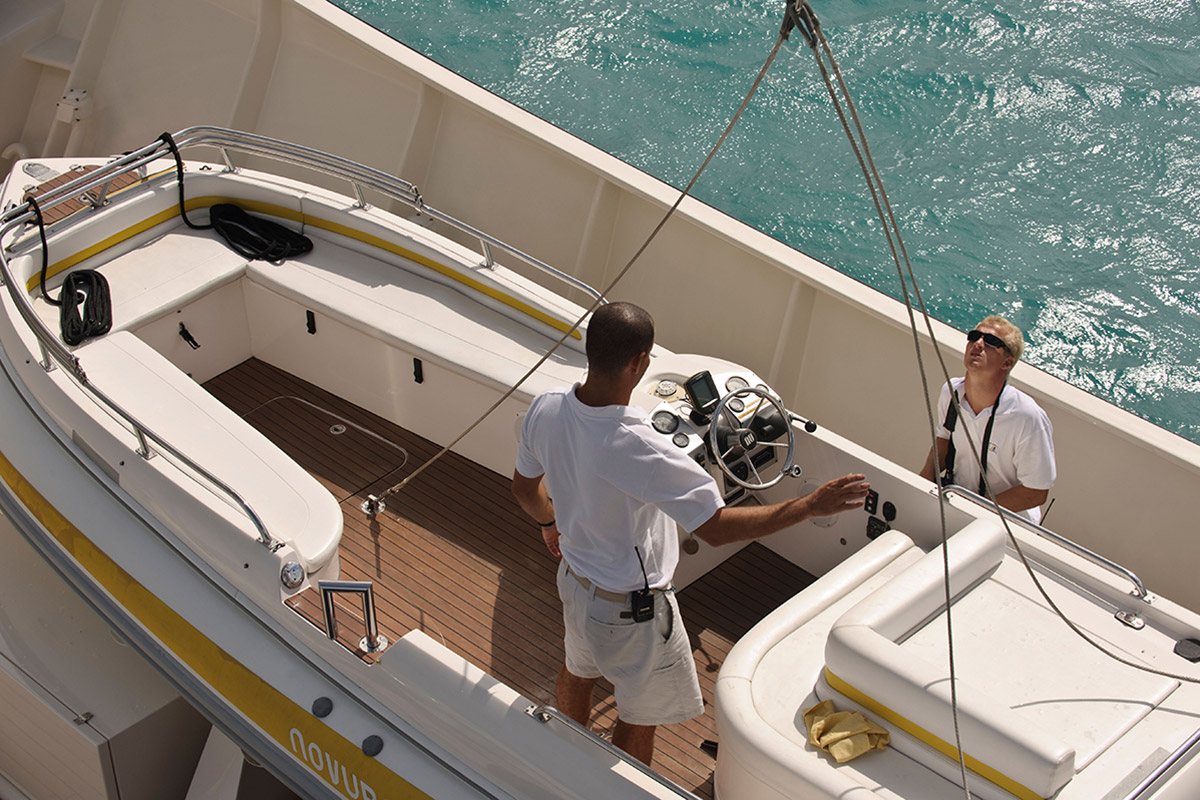
A deckhand communicating with his team while getting ready to drop anchor
Engine Department Roles
Chief Engineer: as head of the Engine Department, the Chief Engineer oversees the mechanical and electrical systems, maintains systems and supervises repairs, and manages the engineering crew members. This position is one of the most vital amongst the mega yacht crew roles as the individual will require an outstanding knowledge of the vessel’s workings, from the engines and generators through to electronics and hydraulics, to offer a smooth and safe voyage.
Engineer: reporting to the Chief Engineer, Engineers carry out daily maintenance to ensure all mechanical and electronic systems are performing as expected. They may troubleshoot when issues arise and, under the supervision of the Chief Engineer, make repairs.

Chief Engineer Dionysios Kakolyris

An entrée being prepared by the yacht Chef
Interior Department Roles
Hotel Manager: as manager of the interior department, the Hotel Manager is responsible for training and overseeing the other interior crew members and is often the first point of contact for guests during voyages. An experienced Hotel Manager can anticipate guests’ needs to provide an unbeatable experience.
Chief Steward/Stewardess: in the absence of a Hotel Manager on smaller vessels, a Chief Steward/Stewardess will manage the interior department.
Yacht Chef: responsible for planning, preparing and delivering meals on board that are suitable for any dietary preferences or requirements and are in line with budgets. An experienced chef with seasonal knowledge and familiarity with cooking different cuisines can heighten the experience for guests on board, making each meal and event for all of the senses.
Head of Service: ensures that the highest level of service is provided across the functions of the vessel throughout the journey, to inject luxury into every detail. They will have impeccable organisation skills and a keen eye for detail. They can provide input on meal direction and service, accompanying drinks, and execute arrangements for onboard events and parties.
Head of Housekeeping: responsible for maintaining the highest standard for the interior, setting cleaning schedules, ensuring provisions are stocked and available to the Stewards/Stewardesses and completing all cleaning duties to ensure the vessel is a welcoming environment for guests throughout the voyage.
Steward/Stewardess: vital amongst mega yacht crew roles, responsible for providing luxury service to guests whilst maintaining the yacht’s interior cleanliness. They will tidy and clean the vessel, including laundry services, while also providing daily services to guests including drink preparations, turn-down services, preparing cabins, meal service and fulfilling any further general care requirements required by guests.
Specialist Crew: specialist mega yacht crew roles from spa managers and therapists, personal trainers, hairdressers and medical professionals can be hired in accordance with the guests’ needs.
Having an experienced crew will not only ensure your mega yacht is maintained in pristine condition and top performance, but filling these mega yacht crew roles with the correct members will transform your yacht into a home. Contact us or find out more about our crew recruitment services .
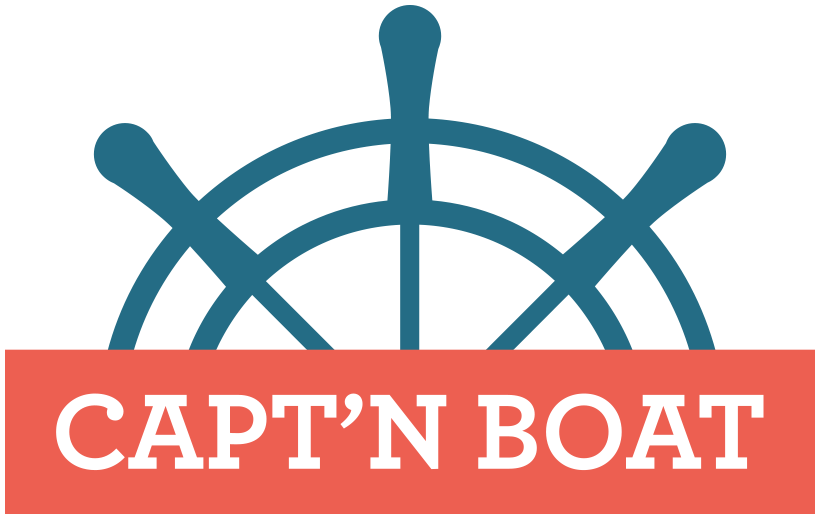
How to become a yacht stewardess? The fundamentals of the job
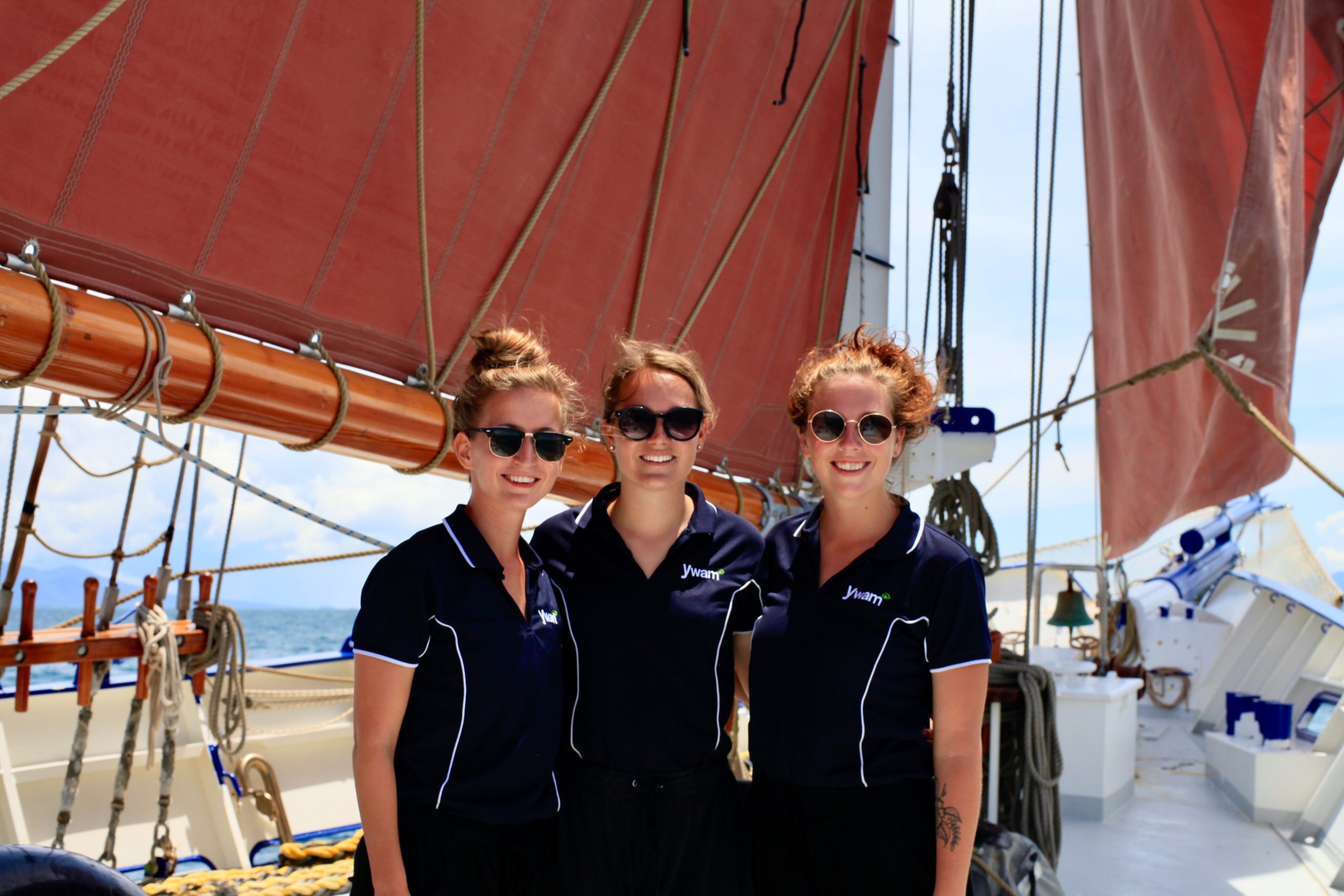
The job of a stewardess on a yacht is growing more and more , just like the global demand for crew members. Although the stewardess position may seem the most accessible, it remains a passionate and demanding job.
Indeed, the job of stewardess on a boat is one of the most diversified and versatile in the maritime industry . In addition to the role of service and reception, a stewardess must ensure the safety of passengers on board alongside the captain/skipper; and be trained to react in case of emergency.
In this article, Capt’n Boat lists the prerequisites for the position of stewardess on a yacht, and the missions that are entrusted to her.
1. What is a stewardess on a boat?
A stewardess (or hostess) on a yacht is a person in charge of the reception and comfort of the passengers on board , whether it is a yacht, a sailboat, a cruise ship or any other type of boat.
The word comes from the Latin “hospes”, which means “host” or “guest”. Over time, the meaning of the word “hospes” has evolved to also include “person who welcomes guests”.
The term “hostess” is therefore used to refer to a person who takes care of the guests or passengers of a ship, ensuring their comfort and well-being during their stay.
The duties of the stewardess may vary depending on the type of boat and the company, and will be detailed later in the article.
2. What professional training to become a stewardess on a boat?
In order to be a stewardess, only one certificate is required: the Basic Safety Training Certificate (BST) .
Obtaining the BST consists of 4 courses:
- Individual Survival Techniques,
- Basic firefighting training,
- Personal Safety and Social Responsibility,
- Medical First Aid.
The BST is valid for 5 years. Without this training, you cannot work as a stewardess on a boat.
An ENG1 certificate is also required, delivered by a doctor approved by the Maritime and Coastguard Agency (MCA).
There is no “degree” as such to become a stewardess on a boat. However, it is recommended to have experience in customer service or in the hotel industry. For stewardess/cook, some shipowners may require a Food Hygiene and Safety Training .
Of course, the best training is experience! Improve your skills on the job, go to sea, do missions! It is with experience that you will improve!

3. Qualities and skills expected from a stewardess on a boat
As a stewardess on a boat, it is important to have the following qualities in order to best manage customer requests:
- Communication skills : Be able to communicate effectively with passengers and crew.
- Service skills : Have a helpful and friendly attitude towards passengers to respond to requests quickly and efficiently.
- Organizational skills : Be organized to plan daily tasks, including cleaning of cabins and common areas, food and beverage supplies, and work schedules.
- For stewardess/cook => Culinary skills : Be able to prepare simple and varied meals to suit guests’ tastes and dietary restrictions.
- Safety knowledge : Yacht stews must have a basic knowledge of onboard safety procedures and be able to provide instructions to passengers in case of emergency.
- Ability to work as a team : With crew members and other personnel on board.
- Patience and resilience : Stewardesses must be able to deal with challenges and difficult situations that may arise on board, while remaining calm and professional.
Proficiency in multiple foreign languages is a major asset for this type of position.
➡ On Capt’n Boat, we regularly have requests for English, Italian or Spanish speaking stewardesses for sailboat/catamaran cruises.
Sign up if you haven’t already and find stewardess assignments all over the world! 👇
Of course, there are other qualities and skills, so don’t hesitate to put them forward in your seaman CV . The more versatile and adaptable you are, the better your missions will be!
4. The missions of a yacht stew
The stewardess is an important member of the ship’s crew and her main role is to take care of the passengers . Indeed, she makes sure that she is available to answer the customers’ requests and ensure their comfort on board. This includes:
- The reception of the passengers,
- preparation of the cabins,
- serving meals and drinks,
- organizing activities for customers,
- maintaining the cleanliness of the boat,
- management of supplies and stocks,
She also ensures the safety on board, with the other members of the crew.
It is important to note that the role of stewardess can vary depending on the size and type of boat, as well as the type of clientele. In some cases, you may also be responsible for preparing meals as a stewardess/cook.
Most of these missions correspond to the job of hotel staff, but here on a floating hotel!

Furthermore, depending on the size of the boat, the stewardess may have to work with a crew. This difference will have an impact on the number of tasks and may place you as the manager of the team on board.
5. Salary of a yacht stewardess
The average salary of a stewardess on a ship depends on many factors, such as experience, the size of the ship, the area of navigation, the type of clientele and the duration of the service at sea. In the West Indies, Spain and Greece, the remuneration of a stewardess is around 200€/day. In France, it is about 250€/day. (Indicative daily wage based on the market standards observed).
As an example, for a one week cruise from Corfu (Greece) on a Lagoon 42 catamaran, count ~ 1400 €.
For a stewardess/cook, this remuneration is higher. You are free to negotiate your salary according to your past experiences.
Working as a yacht stewardess is a rewarding work experience. Although there is no specific background required, experience in the hospitality industry can be a plus.
If you like customer relations, teamwork, and above all, have a liking for the sea: this job is for you! An affinity with the maritime world is obviously required: you will be housed on the boat, so you will certainly be subjected to the swell and potential bad weather!
Register on Capt’n Boat and find missions all over the world!

Related Posts

100% growth in 2023 for the 3rd consecutive year – Capt’n Boat makes the review

Skipper Jobs: How to find Capt’n Boat missions easily

Cruise in Sardinia With a Skipper: Antoine’s Logbook

How To Become A Yacht Stewardess: 11 steps you NEED to take
So you want to join the wide and crazy world of yachting? It is a great opportunity to travel the world, save money and meet interesting people from all over the world, but where do you begin?
I’m sure you are asking yourself, how do I become a yacht stewardess? What do I need to do to land my dream job?
That is what I am here for, to teach you from experience, how exactly you become a stewardess on a super yacht.
As long as you follow this step-by-step guide, I can almost ensure you that you will land a job as a stewardess on a yacht.
I know from first-hand experience everything you need to do to land your first job. So if you are ready to get your first yachting job, let’s dive in.
How To Become A Yacht Stewardess?
Getting a stewardess job on board a yacht is not hard, all it takes is a few courses that can be done in a week, and you will be set and certified to get your first job.
Step 1: Decide to Go for it
Deciding to make the plunge into yachting, is probably the hardest part.
Once you are mentally prepared and excited to join yachting the rest will come easy and natural. I think the hardest part is actually making the decision to do so. So if you are reading this, most likely you are already there.
Step 2: Get Everything in Order
You are going to want to be prepared as possible before you leave to try and get a job on a superyacht, this means that you are going to want to have enough money saved.
It could be a month or two before you land your first job, so you are going to want to have enough money to support yourself during this time.
You will also need money to get all the certificates and training you will need before you leave.
Besides this, you are most likely going to want to get rid of most of your expenses back home. This means packing up your apartment so you won’t have to pay rent while you are gone.
You might even want to think about selling your car or storing it somewhere it will be safe.
Also, you need to be prepared to pack only your basic belongings. You don’t want to show up to the boat with suitcases full of useless stuff.
Minimizing everything is key.
Step 3: Get Your STCW 95 and ENG 1
To start with you are going to need to get your STCW 95 this is your basic training course that everyone needs to work on a boat, cruise, super yacht, sailboat, or any vessel that goes to sea.
It is basic sea survival, first aid, fire fighting, and sea knowledge all packed into a one-week course. This is the course breakdown
1. Fire Prevention and Fire Fighting (Basic Firefighting) 2. Personal Survival Techniques (PST) 3. Personal Safety and Social Responsibility (PSSR) 4. First Aid / CPR (Basic First Aid) 5. Proficiency in Security Awareness (PSA)
It is impossible to get a job on a yacht unless you have this. The course can cost anywhere from $800 – $1500 depending on where you do it. This might seem like a lot of money, but you will make it back so fast once you get your first job.
The next bare minimum thing you will need before you step foot on a yacht is your ENG 1.
This is a medical exam that proves you are fit to go to sea. Yachts go to off-the-beaten-path places, and you can spend several weeks doing a crossing where you will not see or touch land.
Before you are employed, your employer is going to want to ensure that you don’t have any medical conditions that might jeopardize your health if you are unable to get immediate medical attention.
YOU WILL NOT GET A JOB ON ANY YACHT UNLESS YOU HAVE BOTH YOUR STCW 95 AND YOUR ENG 1
After these any other courses, you can find online can help you obtain your first job, but no course will compare to first-hand experience.
Being a female and going for your first yacht stewardess job is easy, you will find work fairly fast as long as you are in a yachty hub and actively looking for work.
Step 4: Get Yourself to a Yachty Hub
I highly suggest doing your STCW 95 in a hot location and trying to pick up work from there. Starting off it is almost impossible to get a job on a yacht unless you are where the yachts are.
These are the top spots you want to be in to get a job on a superyacht
- Fort Lauderdale, FL
- Antibes, France
- Palma de Mallorca, Spain
These are going to be the best spots for you to find your first job. After you have some experience you can be almost anywhere in the world and if a boat wants you they will fly you to the boat, but not for your first job.
Step 5: Make a Kick-Ass CV
After you have the basic training you are going to want to create a kick-ass cv/resume. You are going to want to list any jobs that you have had in the past that is going to related to a yacht stewardess job. Some examples are
- Anything in the Service/Hospitality Industry
- Yoga Instructor
- Massage Therapist
- Hair Dresser
Also, very important to note that your yacht CV is going to have to have your picture on it. Take a clear shot of your face, wearing a white polo shirt.
Not only that you have to list your age, nationality, and driving record. Plus, all the yachting courses you have taken. It is also a good idea to list your interests. This is a key element to help you stand out from the others.
For more information on How to get a job on a superyacht.
Step 6: Network
Also starting off you are going to want to network, network, network. This is going to be how you will find your first job.
First, you will want to join all the Facebook groups there are to search for jobs. Here are some ones to get you started
- Yacht Stewardess Jobs
- Antibes Yacht Crew
- Fort Lauderdale Yachties
- Yacht Crew Wanted
Besides these Facebook groups, there are other websites that are great for looking for jobs.
- Crewseekers
In the early stages of your career, it is so important to network. When you take your STCW 95 network with everyone in your class and go to the hot yachting bars to network and meet people. This is how you are going to get your first job.
Also, when you are looking for work or taking your STCW 95 you are going to want to stay in a crew house.
This is a temporary house that the yacht crew uses when they are looking for work or in between jobs. Usually, who you decide to take your course with will recommend some crew houses that are near their facility.
I highly recommend staying in a crew house, it is great for networking.
Step 7: Apply, Apply Apply
A lot of yachting especially in the early years is all about being in the right place at the right time. You are most likely going to apply for 20 + jobs before you get a callback. Don’t get discouraged. Stick with it, and keep applying to as many jobs as you can every day until you get one.
Yachting is a weird industry, because not only do you need to hire someone that has the right skillset.
You need to hire someone that is going to fit in with the crew. Be the right nationality. Be the right age and have the same interests as the other crew. Don’t let rejection get you down, the right boat is out there for you.
Step 8: Prepare for the Interview
So you landed your first interview with a boat. Congratulations, but how do you prepare? Most likely the interview is going to be on the boat or at least in person, so you are going to want to dress the part.
You are going to want to wear that white polo that you wore in your CV to the interview along with a nice skort, shorts or skirt that isn’t too short.
They are going to want to see you presented in what you will look like in uniform, so dress accordingly. Have your hair neat and pulled back, and don’t wear heavy make-up.
Be sure to wear flip-flops or shoes that are easy to take off before you board the boat.
Step 9: Ask Questions
The best life advice I can give anyone is ask questions at the interview. This shows that you are interested in the job and that you have done your research. When captains are looking for new crew for the boat, they not only want to make sure you are the right fit for the boat but that you are going to be happy as well.
Captains want crew that are going to stick it out for the long haul and not leave the boat straight away.
Here are some great questions to ask during your interview .
Step 10: Celebrate Your New Job
Now that you have aced your interview it is most likely that you have landed your first job on a yacht. Time to celebrate. They will be asking you to move on board in no time. Enjoy your last few days off the boat.
Soon you will be working as a yacht stewardess. You will most likely be working demanding hours, learning all sorts of new things to do with cleaning, laundry, guest services, and of course looking after the crew.
I know it’s hard to think about, but enjoy your last few nights in the crew house and celebrate with all the friends you have made so far. Your dreams are about to come true.
Step 11: Move Onboard and Start Your New Life
Now that you have celebrated your new job. It is time to move on board and get serious. Time to work out, meet your new boat family, and get to know your roommate.
Congratulations you made it as a yacht stewardess.
But what exactly do you do now.
What does a yacht stewardess do?
Now that we have talked about how to get a job as a yacht stewardess, we should probably discuss what your job will actually entail.
For the most part and first starting off in the industry you are mainly going to be doing laundry, cleaning guest cabins, maintaining the crew mess, and whatever else you are needed for.
You will most likely be doing so much laundry, that you will be a pro in no time.
When you are first starting off, you need to learn the ins and outs of the industry and you will be stuck with the worst jobs, but stick it out and you will work your way up the ranks in no time.
Before you know it you will be a chief stew on a yacht managing 3 girls below you missing your days in the laundry room.
Also, besides the common jobs, you will be assigned it is also your job as a yacht stewardess to be a good crew member and to keep morale high within the crew.
Plan fun nights out for the crew, organize bday parties and gifts, and keep the boys align.
How Much Does a Yacht Stewardess Earn?
Starting off as a junior stewardess you can expect to earn around $3,000, this is your wage and before tips, if you happen to be lucky enough to get a job on a charter boat.
This might not sound like a lot of money, but when you no longer have to pay rent, food, or any other expenses you are able to save almost 100% of this besides your entertainment money.
Also, this number will increase dramatically the longer you stay in the industry. If you become a chief stewardess on a larger boat 200 + feet you will most likely be on $8,500 or more a month and could very much be on rotation, meaning working 2 months and having 2 months off paid.
Not a bad salary for only working half the year.
What Are The Benefits Of Becoming A Yacht Stewardess
Yachting is an incredible industry. You are able to travel the world, meet people from all over the world, earn a ridiculous salary and save a ton of money all without a college degree.
It is a great job to do as a gap year or two if you want to save money for college, or if you just want to travel the world. Yachting has given me so many opportunities and experiences that were beyond my wildest dreams.
I was able to ride in a submarine, attend Monaco Grand Prix, shopping sprees in Gucci and so much more. Yachting is the door to a world you never could imagine.
Not only is it a fun and exciting job, but it offers so many benefits.
Conclusions On Becoming A Yacht Stewardess
Yacht stewardess is not a job for everybody. You have to be social, and ok with sharing your space. As you will be sharing a cabin and most likely there is always someone around.
Related Content
- Best Entry-Level Yacht Jobs
- How To Become A Yacht Chef
Best Questions To Ask Before Joining A Yacht
About the author.
Megan Kulluk
Related posts.

Guide To Dock Walking

Yacht Chef, How To Become One!

Leave a Comment Cancel Reply
Your email address will not be published. Required fields are marked *
Save my name, email, and website in this browser for the next time I comment.
Work On A Yacht
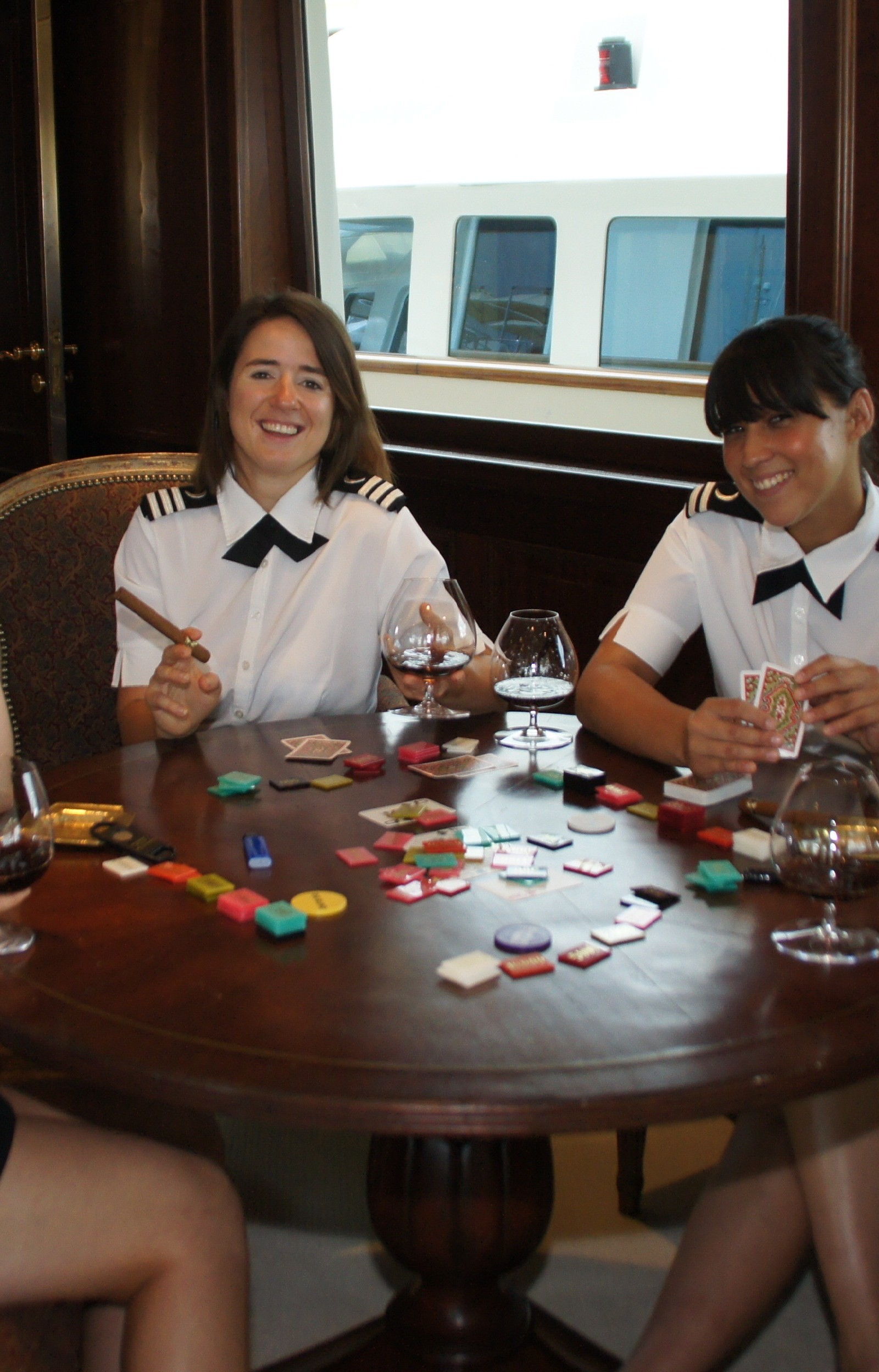
From the Blog Subscribe Now
Yacht Stewardess Training to Work as Interior Crew
September 16, 2018 By Julie Perry
If you are 100 percent confident that you want a crew job in the superyacht industry, then you need to think about training. There are two essentials: Plan on taking a five-day STCW Basic Safety Training Course (which is mandatory) and then a comprehensive three- to five-day yacht steward/ess training course . Once those two weeks are up, your chances of being hired as an entry-level stew are vastly improved… as is your confidence.
I Must Confess…
Yacht stew training was mind-boggling..
When I signed up for yacht stewardess training, I was under the impression that this was simply a course on serving food and being a hostess to the guests. To my surprise, they spent an entire day teaching us nautical terms and familiarizing us with the layout of a yacht. For someone who didn’t have much recreational-boating experience outside of water skiing on lakes in northern Indiana, it was exactly what I needed. (Perhaps it’s news to you, as it was to me, that the various sides of a boat are referred to as port, starboard, aft, and forward.)
We also learned how to tie knots and handle lines because, they forewarned us (as I have you), oftentimes the stew is called out on deck to help the deckhands when the yacht is docking. I took full advantage of the opportunity to become versed in these basic and introductory yachting terms, and the effort wound up saving me from some otherwise embarrassing moments when I took my first job.
In the remaining days, they taught everything from how to serve caviar to how to iron a shirt properly. But it didn’t stop there. In fact, they spent half a day going over cleaning products and which ones to use on which surfaces.
We spent time on how to get out each kind of stain—be it on laundry or interior fabrics. We learned how to fold sheets, make beds, and polish silver. And of most benefit, we learned all about the types and methods of silver service and were even expected to perform our newly acquired skills in the practical portion of the class.
It was a week of heavy learning, but less than a week after earning my certificate, I got my first job.
I am confident that had I not completed the course, I would not have been hired for the position. If you want to know the truth, I think the chief stew on that boat (who, by the way, had not taken the course) pushed to get me hired so she could pick my brain on what I’d learned. And yes, once onboard, I often wondered how any entry-level stew could get away without having this training.
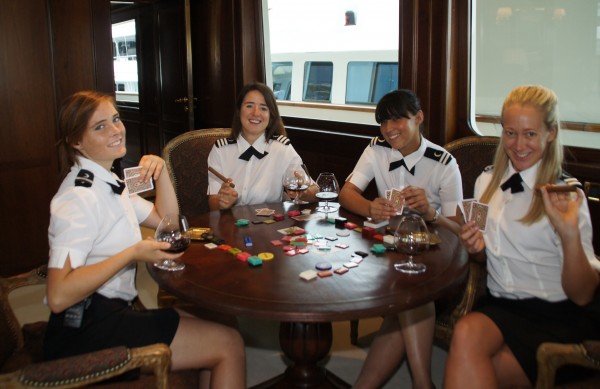
Stewardesses on M/Y “Big Aron” taking a break onboard. Photo by Suki Finnerty of YachtingToday.TV.
Think all this talk of laundry, cleaning, and guest service sounds like back-breaking work? Well, it’s certainly not easy. Being a yacht stewardess is a physically demanding job, if not also mentally challenging when you figure in having to communicate with and get along with so many different types of people in such a confined space. (And by that, I mean getting along with the guests and the crew.)
Take a look at this video, “ Happy Working Stews ,” a 1st Place winner in the Comedy genre of the 2010 Fort Yachtie Da International Film Festival , a fun yacht-crew event produced each year by Crew Unlimited and C U Yacht Charters (happening this year on November 16, 2013). This video was done by Mish Marchio, and is superb. Note: the video doesn’t begin playing until around the :22-second mark:
Makes it look kinda fun, huh? Well, it certainly can be!
So is specialized stew training mandatory? No…at least not yet. But I cannot recommend it highly enough!
The introductory interior and exterior courses, even though these are not mandatory courses, have been developed to give you the skills, knowledge, and confidence to understand what your job entails as a professional steward/ess aboard or deckhand aboard a superyacht.” —Joy Weston, owner and operator of Crew Pacific (Australia) since 2001
One of the main reasons I advocate this training is because it will help you to land a job much faster. Of course, you also have to look at it this way: You want to be as prepared as possible so that you are as comfortable as possible when you accept your first position. You wouldn’t take on a job working at a computer all day if you had no idea how to type, would you? Having specialized stew training prior to taking employment on a yacht will give you confidence that you know what you are doing, and that will be reflected in your attitude and demeanor with your fellow crew and guests.
Check the various training schools’ websites for yacht stewardess training courses (also known as interior crew training ) to see if any are offering package deals where you can sign up for both STCW Basic Safety Training and an Interior Crew Course together at a discount. Remember, you’ll make this money back in the first month of full-time employment. Consider it an investment.
Another way to get started on your way to landing a job as a luxury yacht stewardess is to read my book, “ The Insiders’ Guide to Becoming a Yacht Stewardess: Confessions from My Years Afloat with the Rich and Famous ” – 2nd Edition.
Not ready to buy yet? Cool. Simply download Chapter 1 for free by clicking the book cover below:

About Julie Perry
Our latest tweets, get our email newsletter.
- Name * First Last
- Email This field is for validation purposes and should be left unchanged.
- Skip to primary navigation
- Skip to content

Find your ideal staff.
Each household is special, and with our staff, yours will be able to thrive.
Any questions or further information, please email us:
[email protected]
Would you like to join our growing team?
Call us on the phone: +44 (0) 780 144 8604
- Housekeeper / Cook
- Nanny Housekeeper
- Live-In Housekeeper
- Live-Out Housekeeper
- Lady’s Maids
- Wardrobe Managers
- Domestic Couples
- House Managers
- Estate Managers
- Live-in Nanny
- Live-out Nanny
- Maternity Nurses
- Private Tutors
- Private Chefs
- Chauffeur/Driver
- Nutritionist Services
- Personal Private Trainers
- Personal Assistants
- Executive Assistants
- Family Office Staff
- United Kingdom
- International
- View all Jobs
- Register for Work
- Housekeeper Jobs
- Laundress Jobs
- Ladies Maid Jobs
- Domestic Couple Jobs
- House Manager Jobs
- Estate Manager Jobs
- Exclusive Butler Jobs
- Houseman Jobs
- Handyman Jobs
- Facilities Manager Jobs
- Maternity Nurse Jobs
- Governess Jobs
- Private Chef Jobs
- Yacht & Jet Crew
- Chauffeur Jobs
- Personal Assistant Jobs
- Salary Guide
- Interview Tips
- Tax Calculator
- REGISTER FOR WORK
- CALL US +44 (0) 780 144 8604

How to Become a Stewardess on a Private Yacht in 2024
Working as a stewardess on a private yacht is a unique and rewarding career choice. It offers the opportunity to travel the world, meet interesting people, and experience a luxurious lifestyle. However, it also requires a specific set of skills and qualifications. This article will guide you through the steps to becoming a stewardess on a private yacht.
Understanding the Role of a Yacht Stewardess
A yacht stewardess is responsible for maintaining the interior of the yacht, providing high-quality guest services, and ensuring the comfort and satisfaction of the yacht’s guests. Duties can range from housekeeping and meal service to managing onboard events and activities.
Required Skills and Qualifications
While no specific academic qualifications are required to become a yacht stewardess, certain skills and experiences can increase your chances of landing a job. These include:
- Customer service experience: Prior experience in hospitality, such as hotels or restaurants, can be beneficial.
- Strong communication skills: You’ll need to interact with guests and crew members effectively.
- Attention to detail: High standards of cleanliness and organization are crucial.
- Physical fitness: The job can be physically demanding, with long hours and lots of manual work.
- First aid and safety training: Many yachts require crew members to have basic first aid and safety training.
Steps to Becoming a Yacht Stewardess
Here are the steps you can take to become a yacht stewardess:
- Gain relevant experience: Start by working in hospitality or customer service roles to develop the necessary skills.
- Get certified: Consider getting a certification from a recognized yachting authority, such as the Professional Yachting Association (PYA) or the Royal Yachting Association (RYA).
- Network: Attend yachting events and connect with industry professionals. Many yacht jobs are filled through word of mouth.
- Apply for jobs: Look for job postings on yachting websites, in yachting magazines, and through yachting recruitment agencies.
Challenges and Rewards of the Job
Being a yacht stewardess can be challenging. The work is physically demanding, the hours can be long, and you may be away from home for extended periods. However, the rewards can be significant. You’ll have the opportunity to travel to exotic locations, work in a luxurious environment, and meet interesting people. Plus, the pay is often very good, especially on larger yachts.
Becoming a stewardess on a private yacht is not for everyone. It requires a specific set of skills, a strong work ethic, and a willingness to live a somewhat unconventional lifestyle.
However, it can be a rewarding and exciting career for those who are up for the challenge. By gaining relevant experience, getting certified, networking, and applying for jobs, you can make your dream of becoming a yacht stewardess a reality.
Was this helpful?
You may also like.

Nanny Housekeepers: The Ultimate Solution for Busy Families
Overwhelmed by the juggle of childcare and home upkeep? Nanny Housekeepers are the ultimate solution for busy families, seamlessly blending loving care with impeccable housekeeping. Embrace the peace of mind that comes with a harmonious home environment, where your children thrive and your living space sparkles. Say hello to your new family superhero!

- INFO FOR STAFF
Understanding the Roles and Responsibilities of a Nanny Job in 2024
A nanny job involves more than just watching children. It includes responsibilities like meal preparation, creating educational activities, and maintaining children’s schedules. Nannies also play a crucial role in children’s development and well-being, requiring skills in communication, problem-solving, and patience. Understanding these roles is key to excelling in a nanny position.
Adding {{itemName}} to cart
Added {{itemName}} to cart

IMAGES
COMMENTS
If possible, go ahead and schedule your personal interview. (Chapters 9 and 10) Book that airplane ticket, and move to a hiring port. (Chapter 8) Once you are physically in a hiring port, go meet with the agencies. I recommend registering with a minimum of two crew recruitment agencies to get started.
All crew need STCW basic safety training, a five-day course, and an ENG1 medical certificate, and some yachts may also require certification in Food Safety & Hygiene, a one-day course. On top of these necessities, there are numerous options for yacht-specific interior training, but many chief stews, like Robert, prefer to teach on the job ...
Julie Perry spent three years as a mega-yacht stewardess, which took her to over 40 ports in 18 countries. And she can tell you how to do it, too. The first edition of her book, "The Insiders' Guide to Becoming a Yacht Stewardess," has been a must-read guide for yacht crew since 2006. With the release of her updated, second edition, Julie ...
Steps to Get a Job as a Yacht Steward/Stewardess: Understand the role of a Steward/Stewardess onboard a yacht. Complete Steward/Stewardess training courses. Complete the My Crew Kit "Steps on How to Work on a Superyacht". Obtain an ENG1 or ENG1 Equivalent Medical Certificate. Select the correct time to travel and look for work.
To be considered for a stewardess position, candidates must have certain qualifications. A high school diploma or equivalent is required, and many employers prefer candidates with a college degree. Candidates should also have a valid passport, a seafarer's medical certificate, and a basic safety training certificate.
The Superyacht Stewardess & Steward Course is a unique programme designed to equip you with the knowledge and skills required to work as a steward or stewardess in the fast-growing superyacht sector with a focus on going above & beyond industry expectations. As part of the course, you will be trained to deliver exceptional levels of service and ...
Step 5 - Daywork and experience. Step 6 - Get the right Yachtie Network and Contacts. Step 7 - Get a Strong Superyacht Reference. Step 8 - Start applying for our Superyacht jobs. Step 9 - Ace your job interviews with your coach. Step 10 - Get a job, bank account and sign contract Claim your Yachtie Careers Deckhand and Stewardess offer.
12 Steps To Becoming A Yacht Stewardess. The best way to become a yacht stewardess is to prepare yourself from all angles. Here are the 12 steps to becoming a yacht stewardess. Research the yachting industry: Understanding the yachting world is very important for aspiring yacht stewardesses.
Become a Steward or Stewardess on a Superyacht. Becoming a Superyacht Steward or Stewardess is the perfect way to combine work and travel. The course is suitable for complete beginners or those with experience who are looking to work as a Steward or Stewardess on a Superyacht.
Becoming a yacht stewardess might just be the perfect career choice for you. In this comprehensive guide, we will walk you through the step-by-step process of how to become a yacht stewardess and embark on a thrilling and rewarding journey. Section 1: Understanding the Role of a Yacht Stewardess.
This yacht stewardess crash course will better prepare you for the industry and teach you some basic skills and principals. Usually grouped with the above essential courses and offered as a combined training package. Stewardess courses are useful for people with no transferable skills that are unfamiliar with the industry.
Julie Perry spent three years as a mega-yacht stewardess, which took her to over 40 ports in 18 countries. And she can tell you how to do it, too. The first edition of her book, "The Insiders' Guide to Becoming a Yacht Stewardess," has been a must-read guide for yacht crew since 2006. With the release of her updated, second edition, Julie ...
Fundamentally, your job will be to ensure that the interior of the yacht is pristine and that the guests are happy at all times. Forget the idea of "work hours"… work can come at any time, day or night. Days are often long and hard, but your time off will be well worth the wait. Be open minded, flexible and ready to accept new and varied ...
Interior Maintenance - Yacht stewardesses are responsible for maintaining the cleanliness and orderliness of the interior spaces, including cabins, salons, and dining areas. This involves daily cleaning, laundry services, and restocking of amenities. Guest Services - Providing personalized guest services is a crucial aspect of a yacht stewardess's role.
How to Become a Yacht Stewardess: The Education Requirements If you want to land a job as a stewardess, you will need to take some short courses that ensure safety and good service on the yacht. If you are looking for an entry-level position, then you will take the most standard courses, while those looking to become a chief stewardess will ...
1. You're comfortable being away from home. Working on a yacht means you're away from home (and likely without service) for months on end. If you're comfortable being away from friends and family for long periods of time, chances are you'd make a great yacht stewardess.
A mega yacht can be considered an ecosystem; with the correct balance and support the onboard experience will thrive but if out of balance, well-being and performance stand threatened. ... Steward/Stewardess: vital amongst mega yacht crew roles, responsible for providing luxury service to guests whilst maintaining the yacht's interior ...
5. Salary of a yacht stewardess The average salary of a stewardess on a ship depends on many factors, such as experience, the size of the ship, the area of navigation, the type of clientele and the duration of the service at sea. In the West Indies, Spain and Greece, the remuneration of a stewardess is around 200€/day.
Step 6: Network. Also starting off you are going to want to network, network, network. This is going to be how you will find your first job. First, you will want to join all the Facebook groups there are to search for jobs. Here are some ones to get you started. Yacht Stewardess Jobs.
Key Moments00:00 Introduction00:49 Ensure that you fit the criteria01:29 Understand the expectations (what will be expected of you)02:04 Decide what you want...
Julie Perry spent three years as a mega-yacht stewardess, which took her to over 40 ports in 18 countries. And she can tell you how to do it, too. The first edition of her book, "The Insiders' Guide to Becoming a Yacht Stewardess," has been a must-read guide for yacht crew since 2006. With the release of her updated, second edition, Julie ...
The following steps explain how to become a stewardess on a yacht: 1. Consider taking a yachting or super yacht course. Gaining a specific yachting or super yacht qualification can significantly improve your chances of securing a position as a yacht attendant. These specialised courses provide a comprehensive overview of the skills and ...
Steps to Becoming a Yacht Stewardess. Here are the steps you can take to become a yacht stewardess: Gain relevant experience: Start by working in hospitality or customer service roles to develop the necessary skills. Get certified: Consider getting a certification from a recognized yachting authority, such as the Professional Yachting ...